- Essay on eco Friendly Diwali

Essay on Eco-Friendly Diwali
Diwali is the festival of lights. It’s a celebration that marks the victory of good over evil, light over darkness and knowledge over ignorance. Diwali is celebrated across all communities of India, creating a homogenous environment of goodwill and happiness. It is a festival to celebrate with family and friends and to light up our and others’ lives with lights, gifts, and sweets. Yet, bursting firecrackers has become a prominent part of the festival. Firecrackers lead to gaseous pollutants emissions that harm the environment and health. Also, the noise causes distress to the elderly, especially to those with heart disease. So, this essay on Eco-friendly Diwali will help students to understand the harmful effect of bursting crackers on Diwali and how it’s impacting the environment.
Students can also go through the list of CBSE Essays on different topics. It will help them to improve their writing skills and also increase their scores on the English exam. Moreover, they can participate in different essay writing competitions which are conducted at the school level.
500+ Words Essay on Eco-Friendly Diwali
Diwali, or Deepavali, is among India’s biggest festivals. The core essence of the festival is that it is the triumph of good over evil, and light takes over darkness. Present-day celebrations of the festival largely comprise people adorning their homes with traditional diyas and lights of various shapes, sizes and colours. They eat sweets and burst crackers. The increasing pollution level, especially in cities and towns, had put a question on bursting firecrackers. It is a worrying problem for environmentalists and common people.
Harmful Effects of Bursting Crackers on Diwali
Huge amounts of crackers and sparklers are burned mainly on the day of the festival and also before and after Diwali. Fireworks contain a lot of chemicals such as potassium nitrates, potassium chlorate, aluminium, iron dust powder, etc. These firecrackers, when burnt, release various gaseous and particulate air pollutants and toxic metals, which degrade the air quality. The emissions reduce visibility to a large extent and generate a dense cloud of smoke. Along with polluting the air, these crackers generate noise pollution; the noise triggers annoyance, aggression, hypertension, high-stress levels, hearing loss and sleep disturbance.
Air and noise pollution leads to serious health hazards.
Tips to Celebrate an Eco-Friendly Diwali
A good way to avoid contributing to the existing pollution is to opt for an eco-friendly Diwali. We should say no to firecrackers. We should light traditional earthen lamps or diyas instead of electric lights or candles. We should use seasonal flowers and leaves for Diwali decoration. We can use old dupattas, silk sarees, etc., for decorations. We must involve our kids and use old CDs, bangles and other craft materials to make interesting decor items. We can make natural rangolis by using natural colours such as rice powder, turmeric etc. Also, we can make rangoli with flowers, petals and leaves. We should buy Diwali gifts by taking care of the environment. We can gift a plant to our relatives. We should avoid the use of plastic and should not buy unnecessary items that generate waste. While hosting a small Diwali get-together, we should use biodegradable plates, cups and glasses. Banana leaf plates and bamboo plates are good options, and for serving drinks, kulhads (mud pots) are the best. The festival can lead to the accumulation of large quantities of waste. So, before throwing the waste, we should segregate the waste and discard it in a responsible manner.
Let’s make the Diwali festival full of happiness, love, sweetness, and peace for all. Let’s enjoy the festival of lights by taking a pledge not to burst a single cracker. Let’s celebrate an eco-friendly Diwali, not a pollution-friendly one.
Students must have found the “Eco-friendly Diwali” essay useful for improving their essay writing skills. They can get the study material and the latest updates on CBSE/ICSE/State Board/Competitive Exams at BYJU’S.
| CBSE Related Links | |
Leave a Comment Cancel reply
Your Mobile number and Email id will not be published. Required fields are marked *
Request OTP on Voice Call
Post My Comment
Register with BYJU'S & Download Free PDFs
Register with byju's & watch live videos.

Essay on Eco-Friendly Diwali
Students are often asked to write an essay on Eco-Friendly Diwali in their schools and colleges. And if you’re also looking for the same, we have created 100-word, 250-word, and 500-word essays on the topic.
Let’s take a look…
100 Words Essay on Eco-Friendly Diwali
Understanding diwali.
Diwali is a major festival in India. It is a time of joy, lights, and sweets. But it also brings noise and air pollution due to firecrackers.
Eco-Friendly Diwali
An eco-friendly Diwali means celebrating the festival in a way that does not harm our environment. This includes avoiding firecrackers and using natural materials for decorations.
This way of celebration reduces noise and air pollution. It also keeps us and our surroundings healthy.
Let’s pledge to celebrate an eco-friendly Diwali. It’s a small step towards saving our environment.
250 Words Essay on Eco-Friendly Diwali
Introduction, environmental impact of diwali.
Traditional Diwali celebrations involve the use of firecrackers, which release harmful pollutants into the atmosphere, contributing to air and noise pollution. Further, the excessive use of electricity for lighting also adds to the environmental burden.
Adopting an Eco-Friendly Diwali
An eco-friendly Diwali can be achieved through several measures. Firstly, the use of firecrackers can be completely avoided or replaced with eco-friendly alternatives that produce less noise and smoke. Secondly, traditional earthen lamps (diyas) can be used for lighting instead of electric lights, reducing energy consumption.
Benefits of Eco-Friendly Diwali
An eco-friendly Diwali not only reduces environmental damage but also has societal benefits. It promotes a cleaner and quieter environment, benefiting the health of individuals and communities. Moreover, buying earthen lamps supports local artisans, thereby contributing to the local economy.
While the concept of an eco-friendly Diwali might seem challenging to implement, it is an essential step towards sustainable living. It is a collective responsibility to ensure that our celebrations do not harm the environment. By adopting eco-friendly practices, we can enjoy Diwali in its true essence – a celebration of light over darkness, and good over evil.
500 Words Essay on Eco-Friendly Diwali
Diwali, the festival of lights, is a cherished celebration in India. However, the environmental impact of this festival has become a topic of concern in recent years. The traditional practices of bursting crackers and using non-biodegradable materials contribute to pollution levels. Therefore, it is essential to transition towards an eco-friendly Diwali, which not only preserves the essence of the festival but also safeguards our environment.
The Environmental Impact of Diwali
The concept of eco-friendly diwali.
An eco-friendly Diwali focuses on celebrating the festival in a way that minimizes harm to the environment. It involves the use of sustainable and environmentally-friendly practices, such as using eco-friendly decorations, minimizing the use of firecrackers, and reducing waste generation. The idea is not to compromise the festive spirit but to find alternative ways to celebrate that are in harmony with nature.
Practices for an Eco-Friendly Diwali
The first step towards an eco-friendly Diwali is reducing the use of firecrackers. Instead, the joy of the festival can be expressed through lighting diyas or candles, which not only reduces pollution but also keeps the tradition alive.
Gift giving is another integral part of Diwali. Instead of traditional gifts wrapped in plastic, consider giving plants or homemade sweets packed in reusable containers. This not only reduces waste but also promotes the idea of sustainability and healthy living.
An eco-friendly Diwali is not just about celebrating responsibly; it’s also about creating awareness and setting an example for future generations. It’s about understanding that our actions have consequences and making conscious decisions to minimize our impact on the environment. By adopting eco-friendly practices, we can enjoy the festival in its true spirit, without compromising the health of our planet. Let’s pledge to celebrate a green Diwali and inspire others to do the same.
Apart from these, you can look at all the essays by clicking here .
Happy studying!
Leave a Reply Cancel reply

Essay on Diwali in English (150, 200, 300, 400 Words)
| Video Lectures | Live Sessions |
| Study Material | Tests |
| Previous Year Paper | Revision |

Diwali, often called the "Festival of Lights," is a widely celebrated and cherished festival in India. In this essay, we will explore the significance and traditions of Diwali in simple and easy-to-understand language.
Diwali is a prominent and much-awaited occasion, and people often search for "Diwali essay in English" to learn more about it. The festival represents the victory of light over darkness and good over evil. It is a time for joy, togetherness, and spreading love and positivity. Diwali typically lasts for five days, and each day holds a special meaning and ritual.
The highlight of Diwali is the lighting of oil lamps and candles, which adorn homes, streets, and public spaces, creating a mesmerizing, illuminated atmosphere. People exchange gifts, share sweets, and wear new clothes. Children eagerly look forward to Diwali for the treats they receive. As we delve deeper into this essay, we will learn about the stories, legends, and customs associated with Diwali, which make it a remarkable and culturally rich celebration in India. So, let's embark on this journey to discover the magic and significance of Diwali.
Diwali Essay In English 150 Words ( For Classes 4 And 5 Students)
Essays on Diwali in 150 words are suitable for class 4 and 5 students. This is one of the most important essays that comes in exams each year.
| Diwali, the festival of lights, is a very old and special celebration. It's linked to a story from Hindu mythology about Lord Rama coming back to his city, Ayodhya, after defeating a demon king named Ravana. When Rama returned, the people of Ayodhya lit oil lamps to show their happiness. This tradition continues today, and Hindus all over the world celebrate Diwali with lots of excitement. Kids especially love Diwali because they get to eat yummy sweets and wear new clothes. But this festival is not just about fun; it also teaches us important lessons. It reminds us that good is more powerful than evil and that light can chase away darkness. During Diwali, Indian homes come alive with a joyful atmosphere. People clean their houses, make delicious sweets, and light many lamps. The day usually starts with a religious ceremony before the evening celebrations begin. Diwali is a time of happiness, togetherness, and spreading light and love. |
Diwali Essay in English 200 Words (For Classes 6,7 and 8 Students)
Diwali essays with a word limit of 200 words are important for English exams of 6,7, and 8-class students.
| Diwali is a time of great joy and celebration. It marks the day when the heroic King Rama defeated evil forces and returned home to a warm and jubilant welcome from his people. While fireworks have become a popular part of Diwali, it's important to remember that the true spirit of the festival is about spreading happiness with your loved ones. Festivals like Diwali are all about strengthening the bonds between families and friends. It's a time when everyone goes back to their hometowns to celebrate with their families. Diwali is a national holiday, so everyone can enjoy the festival without worrying about work. The excitement grows as night falls, with the release of sky lanterns that light up the dark sky. Diwali teaches us the value of patience and waiting for good things in life. Children eagerly anticipate the delicious sweets they'll get to enjoy. It's also a time when houses are thoroughly cleaned, not just to make them look nice but also to promote health and wellness. Diwali is deeply rooted in Hindu culture and imparts the moral lesson that "good people always triumph over bad ones." So, it's not just a time for celebration, but also for reflection and learning important life lessons. |
Diwali Essay in English 300 Words (For 9,10 and 11 Class Students)
Diwali essays in 300 words are important for class 9,10 and 11 class students for their English exams. This essay is frequently asked in the writing section of the English exam.
| Festivals are an essential part of human life. They're like a special reminder of our values - like unity, sharing, and the fact that humans are social beings. One such festival that is celebrated with great joy is Diwali. Diwali is a Hindu festival that marks the return of King Rama to Ayodhya after a big battle with the demon king Ravana. It's all about the victory of light over darkness. Festivals are a wonderful way to connect with our neighbors and celebrate with them. Diwali reminds us to be kind to everyone and to have patience, believing that good things will come. Our beliefs have a big influence on how we think, so we should hold onto our faith in festivals like Diwali. For a long time, Diwali has been linked to fireworks, but do we need them? Not really! Diwali can still be a fantastic celebration if we stay home and have a lovely dinner with our friends and family. Fireworks release harmful gases into the air, causing pollution that's bad for our planet. They also scare and harm animals living nearby. So, it's important to celebrate responsibly, without putting others in danger. During Diwali, our homes are filled with the delicious smell of freshly cooked food. We cook and enjoy lots of tasty dishes during the festival. But we must remember that festivals are meant to bring us closer and strengthen our bonds, not harm the environment in the name of celebration. So, let's celebrate Diwali with joy, kindness, and consideration for all living creatures and the world around us. |
Diwali Essay in English 400 Words: (For Class 12 and Other Competitive Exams)
Diwali Essays in 400 words or more are important for class 12 boards English exams. It is also important for competitive exams to test the writing skills of students.
| Diwali, also known as Deepavali, is a widely celebrated Indian festival that spreads joy and marks the triumph of good over evil. This festive occasion is cherished throughout India, promoting happiness, unity, and victory. It holds a special place in Indian hearts and is rooted in the ancient epic, Ramayana, which tells the story of Lord Rama's return from exile. The name "Diwali" comes from the Sanskrit word "Deepavali," which translates to "row of lights." During this festival, people illuminate their homes and workplaces with lamps, typically earthen ones. This beautiful tradition symbolizes the victory of light over darkness, signifying hope and positivity. Diwali usually falls in October or November, following Dussehra by approximately 20 days. It is celebrated during the Hindu month of Kartika. This festival, often referred to as the "Festival of Lights," is one of the grandest and most significant celebrations in India, focusing on spreading joy, fostering unity, and celebrating victory. "Deepavali" is a Hindi term that perfectly captures the essence of the festival, as it signifies a delightful array of lamps. The sight of these glowing lamps adds radiance to the surroundings, creating a warm and cheerful atmosphere that reflects the festival's core message of illuminating life with positivity and dispelling darkness. Diwali is a time when people come together, exchange gifts, and share delectable meals, reinforcing the spirit of togetherness and the triumph of good over evil.
Diwali, a cherished Indian festival, is celebrated in honor of Lord Rama's return to Ayodhya after 14 years of exile. During this exile, he battled demons and the powerful demon king Ravana, who ruled Lanka. When Rama finally returned, the people of Ayodhya lit oil lamps, or diyas, to welcome him and celebrate his victory. This act of lighting lamps symbolizes the triumph of good over evil, a theme central to Diwali. In India, Diwali is a time of joy and celebration. People adorn their homes and workplaces with various lights, prepare delicious meals, exchange gifts, and share happiness. It holds special importance for Indian businesses as it marks the first day of the financial new year. During Diwali, homes come alive with vibrant rangoli decorations in courtyards and the glow of lamps atop them. People dress in new clothes, savor delectable dishes, light lamps, and, as the sun sets, set off fireworks to mark the occasion. Diwali is not just a one-day event; it spans five festivities. The first day, known as Dhanteras, is dedicated to the worship of wealth and Goddess Lakshmi, and it involves the custom of purchasing something precious. The second day, Naraka Chaturdashi or Choti Diwali, begins with people waking up early to apply aromatic oils before bathing, symbolizing the removal of sins and impurities from their lives. The third day is the main festival when people wholeheartedly worship Goddess Lakshmi, the deity of wealth. They dress in new clothes, offer prayers, light diyas, and enjoy fireworks. The fourth day, Govardhan Puja or Padva, commemorates Lord Krishna's victory over Indra by lifting the enormous Govardhan Mountain. People create a small hillock from cow dung to symbolize Govardhan and offer their reverence. The fifth day is Bhai Dooj, where sisters visit their brothers' homes and perform a 'tilak' ceremony. Sisters pray for their brothers' long and happy lives, while brothers offer valuable gifts in return.
Preparations for Diwali hold great significance for Indians and begin a month before the festival. People shop for new clothes, gifts, books, lights, fireworks, sweets, and dry fruits, enhancing the festive spirit and creating a sense of togetherness and excitement. Diwali is truly a time for bonding, celebrating good over evil, and spreading happiness. Diwali is a time when many people believe in letting go of old things and welcoming new ones. This includes getting rid of unused items at home and buying fresh things to make everything feel new and vibrant. The festival is linked to the belief that Goddess Lakshmi visits places of worship, like homes and offices, during Diwali to bless them. As a result, people celebrate Diwali with great discipline and devotion.
But, considering the harm to the environment and the danger it poses, it's advisable not to burst too many crackers. Firecrackers are not safe as they're often made of harmful materials, and there have been instances of kids getting hurt while bursting them. It's best to have adults supervise and reduce the number of crackers to avoid causing air and noise pollution. The loud noise also scares animals, making it a difficult time for them. So, it's important not to forget about the environment and the harm crackers can cause to animals. You can still enjoy the festivities with beautiful lights and have a great time. To preserve the tradition, you can choose to burst just a few crackers and celebrate in an eco-friendly way. Diwali is a festival that brings joy to everyone. However, amid all the celebrations, it's easy to overlook the fact that bursting crackers lead to noise and air pollution. This can be dangerous, especially for kids, and can even result in severe burns. The use of firecrackers also worsens air quality and visibility in many areas, leading to accidents that are often reported after the festival. That's why it's vital to celebrate Diwali in a safe and eco-friendly manner, ensuring that the joy of the festival doesn't harm our environment or our loved ones. |
Read More Essays in English for School Students
Click here to get exam-ready with eSaral
For making your preparation journey smoother of JEE, NEET and Class 8 to 10, grab our app now.
Download Now
eSaral Gurukul
- JEE Coaching in Kota
- NEET Coaching in Kota
- NEET Question Paper
- NEET 2024 Question Paper
- NEET 2024 Exam Date
- JEE Main 2025
- JEE Main Question Paper
- JEE Main 2024 Question Paper
- JEE Main 2023 Question Paper
- JEE Main 2022 Question Paper
- JEE Main 2021 Question Paper
JEE Advanced
- JEE Advanced Question Paper
- JEE Advanced 2024 Question Paper
- JEE Advanced 2023 Question Paper
Our Telegram Channel
- eSaral NEET
- eSaral Class 9-10
All Study Material
Essay on Diwali
Here we have shared the Essay on Diwali or Deepawali in detail so you can use it in your exam or assignment of 150, 300, 500, or 1000 words.
You can use this Essay on Diwali in any assignment or project whether you are in school child (class 10th or 12th), a college student, or preparing for answer writing in competitive exams.
Topics covered in this article.
Essay on Diwali in 150 words
- Essay on Diwali in 250-300 words
- Essay on Diwali in 500-1000 words
Diwali, the festival of lights, is a widely celebrated Hindu festival in India. It symbolizes the victory of light over darkness and good over evil. During Diwali, homes are adorned with lights, rangolis, and decorations. Families come together, exchange gifts, and enjoy delicious sweets and snacks. Fireworks illuminate the night sky, adding to the festive atmosphere.
Diwali holds deep spiritual significance, commemorating Lord Rama’s return to Ayodhya after defeating the demon king Ravana. It also marks the beginning of a new year for many communities. Beyond its cultural and religious importance, Diwali promotes unity, joy, and compassion. It encourages people to spread happiness and love, transcending differences.
In conclusion, Diwali is a festival that brings people together, celebrates the triumph of good over evil, and spreads light and joy. It is a time to appreciate the blessings in our lives and to share happiness with others.
Essay on Diwali in 250-350 words
Diwali, also known as Deepavali, is one of the most significant festivals celebrated in India. It holds immense cultural, religious, and social importance for people of the Hindu faith. The festival spans over five days and signifies the victory of light over darkness and good over evil.
Diwali is a time of immense joy and enthusiasm. The preparations begin weeks in advance as people clean and decorate their homes. Colorful rangolis, Diyas (earthen lamps), and decorative lights adorn every corner, creating a mesmerizing ambiance. The air is filled with excitement and anticipation as families come together to celebrate.
The festival is deeply rooted in mythology. It commemorates Lord Rama’s return to Ayodhya after 14 years of exile and his victory over the demon king Ravana. The lighting of lamps and the bursting of fireworks symbolize the triumph of light and righteousness. Goddess Lakshmi, the goddess of wealth and prosperity, is also worshipped during Diwali. People offer prayers and seek her blessings for a prosperous year ahead.
Diwali is not only a religious festival but also a time for social bonding and celebration. Families and friends exchange gifts, sweets, and heartfelt wishes. The festival brings people from diverse backgrounds together, fostering unity and harmony. It is a time to forgive past grievances, mend broken relationships, and spread love and joy.
However, in recent years, there has been a growing awareness about the environmental impact of Diwali celebrations. The excessive use of firecrackers contributes to air and noise pollution, harming both humans and the environment. Many people are now opting for eco-friendly celebrations by using less harmful alternatives like decorative lights and celebrating with eco-friendly fireworks.
In conclusion, Diwali is a vibrant and joyful festival that celebrates the triumph of good over evil. It brings families and communities together, spreading happiness, love, and prosperity. While celebrating, it is essential to be mindful of the environmental impact and embrace eco-friendly practices. Diwali is not just a festival of lights; it is a celebration of life, positivity, and the enduring spirit of goodness.
Essay on Diwali in 500 words
Title: Diwali – The Festival of Lights and Spiritual Significance
Introduction
Diwali, also known as Deepavali, is one of the most prominent and widely celebrated festivals in India. It holds immense cultural, religious, and social significance for people of the Hindu faith. The festival spans over five days and signifies the victory of light over darkness and good over evil. This essay explores the various aspects of Diwali, including its historical, religious, and social significance.
Historical and Religious Significance
Diwali finds its roots in ancient Indian mythology and legends. The most well-known story associated with Diwali is the return of Lord Rama, along with his wife Sita and brother Lakshmana, to the kingdom of Ayodhya after 14 years of exile. Their return symbolizes the triumph of righteousness over evil. Lord Rama’s victory over the demon king Ravana is celebrated with great fervor during Diwali.
The lighting of lamps and bursting of fireworks during Diwali signify the removal of darkness and the spreading of light and positivity. The tradition of lighting Diyas (earthen lamps) and illuminating homes and streets represents the victory of good over evil and the triumph of knowledge over ignorance. It is believed that these lights guide Goddess Lakshmi, the deity of wealth and prosperity, into people’s homes.
Social Significance
Diwali is not only a religious festival but also a time for social bonding, family gatherings, and community celebrations. Families come together to clean and decorate their homes, exchange gifts, and share festive meals. The festival brings people from diverse backgrounds together, fostering unity, love, and harmony.
During Diwali, people visit their relatives and friends, exchanging sweets, dry fruits, and gifts as a token of love and affection. It is also a time to forgive past grievances and mend broken relationships, as the festival promotes the spirit of forgiveness, reconciliation, and compassion.
Cultural Celebrations
Diwali celebrations go beyond religious rituals. The festival is marked by colorful rangoli designs, vibrant decorations, and intricate patterns created with colored powders, flowers, and Diyas. Fireworks light up the night sky, filling the air with joy and excitement.
The festival also showcases the rich cultural heritage of India. Traditional dances, music, and performances are organized to entertain and engage the community. Diwali melas (fairs) are held, featuring various cultural activities, folk dances, and food stalls. These events provide an opportunity for people to come together, celebrate, and appreciate the diverse cultural tapestry of India.
Environmental Concerns
While Diwali is a time of celebration and joy, it is essential to address the environmental concerns associated with the festival. The excessive use of firecrackers contributes to air and noise pollution, which poses health hazards and disturbs the ecosystem. It is crucial for individuals and communities to adopt eco-friendly practices, such as minimizing the use of fireworks and opting for environmentally friendly alternatives like decorative lights and lamps.
Diwali, the festival of lights, holds immense cultural, religious, and social significance in India. It is a time of joy, togetherness, and the triumph of good over evil. Diwali celebrations embody the values of unity, love, forgiveness, and the spirit of giving. However, it is equally important to celebrate the festival in an environmentally responsible manner. By embracing eco-friendly practices, we can ensure that the essence of Diwali, as a festival of light and hope, is preserved for future generations to enjoy.
Essay on Diwali in 1000 words
Title: Diwali – A Celebration of Light, Joy, and Cultural Significance
Introduction:
Diwali, also known as Deepavali, is one of the most widely celebrated festivals in India and holds immense cultural, religious, and social significance. The festival stretches over five days, and each day has its own significance and rituals. Diwali is a time of vibrant celebrations, where people come together to illuminate their homes with lamps, exchange gifts, indulge in delicious sweets, and participate in various cultural activities. This essay explores the historical origins, religious significance, cultural traditions, social impact, and environmental considerations associated with Diwali.
I. Historical Origins of Diwali
The roots of Diwali can be traced back to ancient Indian mythology and various historical events. One of the most popular legends associated with Diwali is the story of Lord Rama’s return to Ayodhya after defeating the demon king Ravana. The people of Ayodhya celebrated Rama’s homecoming after 14 years of exile by lighting lamps, signifying the triumph of good over evil. Diwali also commemorates the victory of Lord Krishna over the demon Narakasura, symbolizing the triumph of righteousness and the eradication of darkness.
II. Religious Significance of Diwali
Diwali holds deep religious significance for Hindus, Jains, and Sikhs. For Hindus, it is a time to worship Goddess Lakshmi, the deity of wealth and prosperity. Devotees clean their homes and create intricate rangoli designs to invite the goddess into their households. Diwali is also associated with the worship of Lord Ganesha, the remover of obstacles, and the offering of prayers to seek divine blessings.
In Jainism, Diwali marks the spiritual enlightenment and liberation of Lord Mahavira, the 24th and last Tirthankara. Jains celebrate Diwali by offering prayers, visiting temples, and engaging in acts of charity and compassion.
For Sikhs, Diwali holds historical significance as it commemorates the release of Guru Hargobind Sahib Ji, the sixth Sikh Guru, and 52 other kings from imprisonment in the Gwalior Fort. This event represents the victory of truth and freedom.
III. Cultural Traditions and Celebrations
Diwali is not only a religious festival but also a time for cultural celebrations and festivities. The preparations for Diwali begin weeks in advance, as people clean their homes and decorate them with colorful rangoli designs, bright lights, and flowers. The lighting of diyas (earthen lamps) and candles is a significant aspect of Diwali, symbolizing the triumph of light over darkness.
During Diwali, families come together to perform puja (worship) rituals, exchange gifts, and share special meals. Traditional sweets and snacks, such as ladoos and gujiyas, are prepared and distributed among relatives, friends, and neighbors. The exchange of gifts signifies love, respect, and the strengthening of relationships.
Cultural performances, such as traditional dances like Garba and Bharatanatyam, music concerts, and plays, are organized during Diwali. These cultural activities showcase the rich heritage of Indian art and provide a platform for artists to display their talent.
IV. Social Impact and Community Bonding
Diwali serves as a unifying force, bringing people from different communities, religions, and backgrounds together. It is a time when families and friends come together to celebrate and bond. Diwali encourages individuals to visit their loved ones, exchange greetings, and share the joy of the festival.
The spirit of giving and sharing is strongly emphasized during Diwali. Many people extend acts of kindness by donating to charities, distributing food to the underprivileged, and supporting those in need. This collective effort to help others promotes empathy, compassion, and social cohesion.
Diwali also fosters a sense of unity and harmony among communities. People of different religions and cultures join in the celebrations, participating in events and exchanging cultural experiences. The festival acts as a platform for cultural exchange, fostering understanding and appreciation for diversity.
V. Environmental Considerations
In recent years, there has been growing concern about the environmental impact of Diwali celebrations. The excessive use of firecrackers during Diwali contributes to air and noise pollution, causing harm to human health and the environment. Additionally, the disposal of firework waste poses a significant challenge.
To address these concerns, there has been a shift towards eco-friendly Diwali celebrations. Many individuals and communities now opt for alternative ways to celebrate, such as using decorative lights, eco-friendly fireworks, and organic materials for rangoli designs. Awareness campaigns promote the use of environmentally friendly practices, encouraging people to celebrate Diwali in a responsible manner.
Conclusion:
Diwali is a festival that encapsulates the essence of Indian culture, spirituality, and social values. It is a time when people come together to celebrate light, joy, and prosperity. Diwali’s historical origins, religious significance, cultural traditions, and social impact make it an integral part of Indian society.
As we celebrate Diwali, it is crucial to remain mindful of the environmental impact and embrace sustainable practices. By promoting eco-friendly celebrations and minimizing pollution, we can ensure that the essence of Diwali, as a festival of light and togetherness, is preserved for future generations to enjoy. Diwali serves as a reminder of the triumph of good over evil, the importance of unity, and the power of love and compassion in our lives.
Related Posts

Essential Elements of Valid Contract (Explained With Examples)

What is World Population? Main Causes, Effects, Top 20 Countries
- Bihar Board
CFA Institute
Srm university.
- Shiv Khera Special
- Education News
- Web Stories
- Current Affairs
- School & Boards
- College Admission
- Govt Jobs Alert & Prep
- GK & Aptitude
- School Life
Essay on Diwali 2023: Long and Short Paragraphs and 10 Lines on Deepavali
Diwali essay in english: happy diwali check here essay on diwali, short paragraph on diwali, easy diwali essay in english 10 lines for kids, diwali essay in english 300 words, long diwali essay in english and eco-friendly diwali essay in english for diwali 2023. download all the essays in pdf format for free., how do you start a diwali essay.
One of the best ways to start your Diwali essay is with a short and sweet Diwali wish for the reader.
Then, introduce how diwali is celebrated.
Talk about the history of diwali and its signifiance.
Essay on Diwali 2023
In this article, school students and college youngsters will find easy, short and simple essay on Diwali in English. These Diwali essays are suitable for grades 5th to 10th, 11th, 12th and beyond school as well. Download all the essays in PDF format for free from the link given at the end.
Diwali Essay in English 10 lines
Line 1: Diwali, is also known as 'Deepavali' or the 'Festival of Lights’.
Line 2: It also marks the beginning of New Year for many cultures in India.
Line 3: It signifies the return of Lord Rama to Ayodhya after defeating Ravana, symbolising the victory of good over evil and light over darkness.
Line 4: People light diyas - earthen oil lamps and adorn their homes with colourful rangolis.
Line 5: On Diwali, people clean their homes and decorate with flowers and colourful rangoli.
Line 6: Neighbours and families exchange gifts and sweets amongst each other .
Line 7: Goddess Lakshmi and Lord Ganesha are worshipped.
Line 8: Diwali is a five-day long festival.
Line 9: Choti Diwali is celebrated one day before Diwali.
Line 10: Diwali is a symbol of good over evil and promotes unity and brotherhood.
Short Essay on Diwali in 200 Words
Diwali, also known as Deepavali, is a beloved and widely celebrated festival in India, symbolising the victory of light over darkness, good over evil, and knowledge over ignorance. Spanning five days, it begins with Dhanteras when homes are cleaned, new clothes and utensils are bought. The second day, Naraka Chaturdashi or Choti Diwali, marks Lord Krishna's victory over Narakasura with oil lamps. The main day, Diwali, worships Goddess Lakshmi for wealth and prosperity, lighting homes with oil lamps, rangoli, and fireworks. Govardhan Puja and Bhai Dooj follow, honoring Lord Krishna and sibling bonds.
Gift exchanges and traditional sweets like ladoos, barfis, and jalebis are integral to Diwali, symbolizing love, respect, and stronger bonds. Hindus celebrate Rama's return after defeating Ravana, Jains mark Mahavira's nirvana, and Sikhs commemorate Guru Hargobind Ji's release on Bandi Chhor Divas.
Environmental concerns have led to eco-friendly celebrations, emphasizing diyas and natural decorations to reduce the carbon footprint.
Essay on Diwali in 300 Words
Diwali, also known as Deepawali, is a significant and joyful Hindu festival celebrated with great fervor. Falling typically in the months of October or November, Diwali holds immense cultural and religious importance as it commemorates the return of Lord Rama to Ayodhya after his heroic victory over the demon king Ravana, symbolising the eternal triumph of good over evil.
During Diwali, homes go through an amazing change. They are made super-clean and look beautiful with colorful decorations. People put lots of lights, pretty flowers, and beautiful designs made of coloured powder outside their homes. It's a time when people love to give and receive gifts. They also wear new and fancy clothes, which makes everything feel even more festive and happy.
The main day of Diwali involves heartfelt prayers and rituals dedicated to Goddess Lakshmi and Lord Ganesha, the divine patrons of wealth, prosperity, and wisdom. Devotees seek their blessings for a life filled with abundance and enlightenment.
Clay diyas, radiant with an array of colors, are lit in every corner of households, symbolizing the victory of light and hope over darkness and despair. Traditionally, firecrackers were used to drive away evil spirits; however, growing concerns about their environmental impact and health effects have led to more eco-conscious celebrations.
Essay on Diwali Festival in 400 Words
Diwali, or Deepavali, is an auspicious and cherished festival celebrated with great fervor and enthusiasm across India. It is a festival that signifies the triumph of light over darkness, good over evil, and knowledge over ignorance. Typically spanning five days, Diwali is a time when families come together to engage in various customs, rituals, and traditions that have deep cultural significance.
Diwali usually falls in October or November. The festivities commence with Dhanteras, the first day, when people engage in thorough cleaning and adorn their homes. This day is also marked by the purchase of new clothes and utensils. The second day, known as Naraka Chaturdashi or Choti Diwali, is observed by lighting oil lamps to commemorate Lord Krishna's victory over the demon Narakasura. The third day, which is the main Diwali day, is dedicated to the worship of Goddess Lakshmi, the deity of wealth and prosperity. Homes are adorned with oil lamps, vibrant rangoli designs, and fireworks light up the night sky to celebrate the triumph of light. This day symbolizes the removal of spiritual darkness and the ushering in of prosperity and good fortune.
The fourth day of Diwali is Govardhan Puja, commemorating Lord Krishna's lifting of the Govardhan Hill to shield villagers from a rainstorm caused by Lord Indra. The fifth and final day is Bhai Dooj, a day dedicated to honoring the bond between brothers and sisters.
Diwali holds religious significance for various communities. Hindus celebrate it as the return of Lord Rama after vanquishing the demon king Ravana. Jains view it as the day Lord Mahavira attained nirvana, and Sikhs commemorate it as Bandi Chhor Divas, signifying Guru Hargobind Ji's release from imprisonment.
Long Essay on Diwali Celebration
Diwali is one of the most significant and widely celebrated festivals in India. It holds immense cultural, religious, and social importance, bringing people from all walks of life together in a spirit of joy and unity. This festival signifies the victory of light over darkness, good over evil and knowledge over ignorance.
Diwali typically falls in October or November. The preparations for Diwali begin weeks in advance, with families eagerly awaiting this grand festival. Homes are thoroughly cleaned and decorated and new clothes and utensils are purchased. This practice not only prepares the physical surroundings but also symbolises the inner purification of individuals and their homes.
The five-day celebration commences with Dhanteras, the first day. On this day, people worship Lord Dhanvantari, the Hindu god of medicine, and Ayurveda. It is also considered auspicious to purchase gold and silver on Dhanteras, as it is believed to bring good luck and prosperity.
The second day, Naraka Chaturdashi, is celebrated to commemorate the victory of Lord Krishna over the demon Narakasura. People wake up early and take an oil bath to purify themselves. They then light oil lamps and candles all around their homes and offices.
The third day is the main Diwali day, also known as Lakshmi Puja. This day is dedicated to the worship of Goddess Lakshmi, the Hindu goddess of wealth and prosperity. Families come together to perform special prayers and pujas to seek blessings for a prosperous year ahead. Homes are adorned with oil lamps, colorful rangoli designs, and flowers. In the evening, people burst firecrackers to celebrate the victory of good over evil.
The fourth day of Diwali is known as Govardhan Puja or Padwa. On this day, people worship Lord Krishna for lifting the Govardhan Hill to protect the villagers from Lord Indra's wrath. People also visit their relatives and friends and exchange gifts and sweets.
The fifth and final day of Diwali is Bhai Dooj, also known as Yama Dwitiya. This day is dedicated to celebrating the bond between brothers and sisters. Sisters prepare special dishes for their brothers and apply a tilak (vermilion mark) on their foreheads. Brothers, in return, give gifts to their sisters.
Long Essay on Diwali, Pollution Free and Eco-friendly Deepavali in 600 Words
Deepawali, also known as Diwali, is one of the most popular and auspicious festivals celebrated in India. Also known as the festival of lights, it marks the victory of good over evil, knowledge over ignorance, and hope over despair. Diwali is celebrated on the darkest night of the Hindu lunar month Kartika, which usually falls in October or November.
The word Diwali is derived from the Sanskrit word Deepavali, which means "a row of lamps." The festival is celebrated by lighting diyas (oil lamps) and candles all around the house and office. This symbolizes the victory of light over darkness and the triumph of good over evil. Diwali is a significant festival for Hindus all over the world. It is a time to celebrate the victory of good over evil, knowledge over ignorance, and hope over despair. The festival also marks the beginning of the new Hindu year.
Diwali is also celebrated to commemorate the return of Lord Rama to Ayodhya after defeating the demon king Ravana. Rama was exiled from Ayodhya for 14 years, and his return was marked with great joy and celebration. The people of Ayodhya lit diyas and decorated their homes to welcome him back. Another reason why Diwali is celebrated is to honor Lakshmi, the Hindu goddess of wealth and prosperity. People perform Lakshmi Puja on Diwali night to seek her blessings for wealth and good fortune.
Diwali is a time for families and friends to come together and celebrate. People clean and decorate their homes, buy new clothes, and prepare delicious food. On Diwali night, people gather to light diyas, perform Lakshmi Puja, and exchange gifts. Diwali is also a time for families and friends to come together and celebrate. It is a time to forgive and forget, and to start fresh. The festival is also a time to give and receive, and to spread joy and happiness. Diwali is also a time for giving back to the community. People donate to charities and help those in need. The festival is a reminder to be grateful for our blessings and to share them with others.
Diwali is celebrated with great enthusiasm and joy all over India. People start preparing for the festival weeks in advance. They clean their homes, decorate them with lights and rangolis, and buy new clothes. On Diwali night, people light diyas and candles all around their homes and offices. They also perform Lakshmi Puja to seek her blessings for wealth and good fortune. After the puja, people exchange gifts with their family and friends. People prepare delicious food and sweets, and share them with their loved ones.
In recent years, there has been a growing awareness about the environmental impact of Diwali celebrations. People are now more conscious about using eco-friendly ways to celebrate the festival.
Eco-friendly Diwali, also known as "Green Diwali," is an environmentally conscious approach to celebrating the festival of lights. It involves minimising the harmful environmental impacts associated with traditional Diwali practices. People choose to use eco-friendly alternatives, such as clay diyas (oil lamps) instead of electric lights, to reduce electricity consumption. Additionally, eco-friendly fireworks, which produce fewer pollutants and noise, are gaining popularity. Rangoli designs made from natural materials and organic, biodegradable decorations contribute to a cleaner and more sustainable celebration. Eco-friendly Diwali aims to preserve the environment, reduce air and noise pollution, and promote a more responsible and harmonious way of celebrating this cherished festival.
Paragraphs on Diwali
Diwali celebrations, five days of diwali, what are the five days of diwali 2023.
Day 1: Dhanteras, Friday, November 10, 2023
Day 2: Naraka Chaturdashi or Choti Diwali, Saturday, November 11, 2023
Day 3: Diwali and Lakshmi Pooja, Sunday, November 12, 2023
Day 4: Govardhan pooja, Monday, November 13, 2023
Diwali 2023 Wishes in English
1. "May the festival of lights fill your life with happiness and prosperity. Wishing you a sparkling and joyous Diwali!"
2. "Happy Diwali! May your life be illuminated with the divine blessings of Lord Rama."
3. "Wishing you a Diwali filled with love, laughter, and all things bright and beautiful. Have a wonderful celebration!"
4. "Wishing you a safe and prosperous Diwali! Let the brightness of Diyas light up your world with success and happiness."
Why Do We Celebrate Diwali?
Get here latest School , CBSE and Govt Jobs notification in English and Hindi for Sarkari Naukari and Sarkari Result . Download the Jagran Josh Sarkari Naukri App . Check Board Result 2024 for Class 10 and Class 12 like CBSE Board Result , UP Board Result , Bihar Board Result , MP Board Result , Rajasthan Board Result and Other States Boards.
- How do we celebrate Diwali 10 lines? + On Diwali, people light diyas - earthen oil lamps and adorn their homes with colourful rangolis. We clean our homes and decorate it with flowers. Neighbours and families exchange gifts and sweets amongst each other as a symbol of good will, well being and best regards. Goddess Lakshmi and Lord Ganesha are worshipped on this day.
- When are diwali holidays in 2023? + Diwali 2023 is on Sunday November 12, 2023. However, the 1st day of Diwali is Dhanteras on Friday, November 10, 2023. Day 2 is Naraka Chaturdasi (Chotti Diwali) on Saturday, November 11, 2023. Day 3 is the Lakshmi Puja or Diwali on Sunday, November 12, 2023. Day 4 is Govardhan Puja on Tuesday, November 14, 2023. Lastly, Day 5 is Bhai Dooj on Wednesday, November 15, 2023.
- SSC JE Answer Key 2024
- APSC PRO Admit Card 2024
- BSF SI Recruitment 2024
- Kerala PSC Staff Nurse Answer Key 2024
- IITM RA Recruitment 2024
- IAS Exam Last Minute Tips 2024
- NFL Engineer Recruitment 2024
- APSC SO Result 2024
- APSC SO Admit Card 2024
- UPSC CSE Admit Card 2024
Latest Education News
Bastar University Result 2024 OUT at smkvbastar.ac.in, Direct Link to Download UG and PG Marksheet
SSC JE Answer Key 2024 OUT at ssc.gov.in: Download Junior Engineer Response Sheet Here
SSC JE Answer Key 2024 OUT: एसएससी जेई उत्तर कुंजी ssc.digialm.com पर जारी, इस लिंक से डाउनलोड करें जूनियर इंजीनियर रिस्पांस पीडीएफ
Current Affairs One Liners: 12 June 2024- New Chief Ministers of Odisha
Brain Teaser: Are You Sharp Enough? Find the Sneaky "C" Hiding Among the Zeros!
Current Affairs Quiz: 12 June 2024- FIH Hockey Men's Junior World Cup 2025
SSC Selection Post 12 Admit Card 2024 OUT: Download Region-wise Call Letter Here
Why India is Renaming 30 Places in Tibet? Know Full Details
Current Affairs Hindi One Liners: 12 जून 2024- भारतीय सेना के अगले प्रमुख
Visual Skill Test: You have hawk eyes if you can find the hidden butterfly in 7 seconds!
BSF HC Ministerial Syllabus 2024: PDF Download For Important Topics, Check Exam Pattern
Modi Cabinet Ministers List 2024: मोदी 3.0 में किस सांसद को मिला कौन-सा मंत्रालय, यहां देखें पूरी लिस्ट
Today Current Affairs Quiz In Hindi: 12 जून 2024- आंध्रप्रदेश और ओडिशा के नए CM
ट्रेन का टिकट खोने या फटने पर क्या करें, यहां पढ़ें
Modi 3.0: Seven Women Included in the Cabinet List; Check Full List Here
Who is Mohan Charan Majhi, Odisha's New CM? Know All About his Political Journey and Education
समुद्र के अंदर से गुजरेगी भारत की पहली बुलेट ट्रेन, यहां पढ़ें पूरी जानकारी
Today Current Affairs Quiz In Hindi: 11 जून 2024- Narendra Modi Cabinet 2024
CUET Answer Key 2024: सीयूईटी यूजी की आंसर की आज हो सकती है जारी, यहाँ से करें Download
SEBI Grade A Eligibility Criteria 2024: Check Age Limit, Educational Qualification

Essay on Diwali
Diwali is known as the festival of lights. It is the most auspicious festival of Hindus celebrated across our country. We celebrate Diwali in the honor of the victory of Lord Rama against Ravana. People decorate their houses with rangoli and lights on this occasion.
On this occasion people put their lights on for the whole day. It is one of the biggest festivals for Hindus. Diwali is celebrated on the 15th day of the Kartik Krishna Paksha. We worship Goddess Laxmi and Lord Ganesha on this day.
In this article, we’ll provide you with 4 sets of essays in an easy and simple language containing 150, 250, 350 and 500 words that will help you understand more about this festival of lights in detail.
Table of Contents
Essay on Diwali 150 Words
Diwali or Deepavali is known as the festival of lights. Diwali is also called Deepawali which means an array of lights. It is a Hindu festival. It is one of the most prestigious festivals celebrated in India. It is widely celebrated by people of every religion and caste in India.
Diwali is celebrated in the honour of the return of Lord Rama after defeating the Lanka king Ravana. When Lord Rama returned to his hometown Ayodhya after the exile of 14 years, people were rejoiced to see him and celebrated with bursting crackers and lighting diyas. This day signifies the victory of good over evil.
People light up candles and lightning lamps on this day. Diwali is a time where people gather around, meet their friends and relatives and have fun. People greet each other with sweets and dry fruits on this day and spread love and happiness. People decorate their homes and shops with lightning candles and diyas, thereby it becomes the most beautiful festival too.
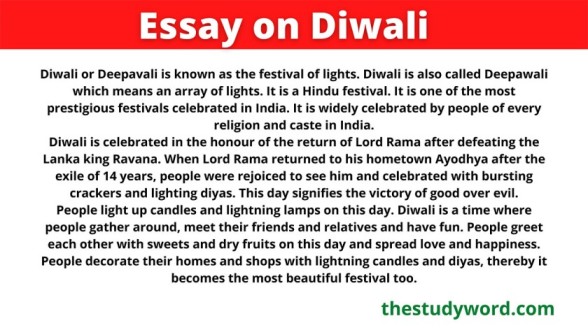
Essay on Diwali 250 Words
Diwali, also known as Deepavali means the array of lights. This is the reason Diwali is called the festival of lights. People light up their homes and places of work with candles, lights, and diyas. It represents the power of light over darkness. Diwali is the most auspicious festival of Hindus.
It is the most widely celebrated festival in India. It is celebrated in the honour of the victory of Lord Rama against Sri Lanka king Ravana. On this day Lord Rama returned home after an exile of 14 years with his brother and wife after killing evil Ravana for kidnapping his beloved wife Sita.
All the people were so happy for his safe return that they burst crackers in joy and happiness. People lit candles and diyas for this occasion to express joy. People greet each other with a lot of sweets, dry fruits and chocolates. On this auspicious occasion, people of India worship Goddess Laxmi and Lord Ganesha and pray for their good health, long life, wealth and success.
This festival is celebrated with pride as it signifies the victory of good over evil. Diwali is celebrated on the 15th day of the Kartik Krishna Paksha. There’s a 18-day gap between Dussehra and Diwali. On this day people go to the temples to worship the gods and lit diyas.
This festival is not only celebrated by the Hindus but people from different religions and castes also celebrate it with great joy. This festival teaches us about all the good things. This festival of lights inspires us to never give up and fight off the bad things.
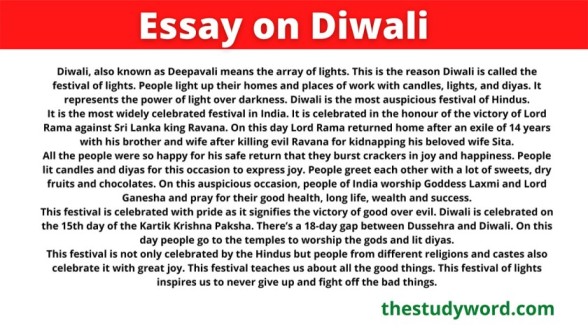
Essay on Diwali 350 Words
Diwali is a Hindu festival. It is one of the most auspicious festivals of India. Diwali is also known as Deepavali which means array of light that’s why this festival is also known as the festival of lights. It is considered as one of the most prestigious Hindu festivals.
We celebrate Deepavali to rejoice the victory of Lord Rama over evil king Ravana. On this day Lord Rama returned to Ayodhya along with his wife and brother after defeating Sri Lanka King Ravana. People of Ayodhya were so happy for the safe return of Lord Rama with his brother and wife that they started bursting crackers and lit diyas to welcome Rama in his hometown after an exile of 14 years.
This festival is celebrated with great joy and pride all across our country. People decorate their houses with rangoli and lights on this occasion. Diwali is one of the biggest festivals of India. Diwali is celebrated on the 15th day of the Kartik Krishna Paksha.
It is celebrated in the honor of the victory of good over evil. Ravan was killed by Lord Rama on Dussehra. There’s a 18 day gap between Dussehra and Diwali. It is not only celebrated by the Hindus but also people from other religions celebrate Diwali. People go to the temples and light diyas and candles and pray for their good health, wealth and success in life.
People decorate their home, temples, places of work like offices and shops with rangoli, lights, diyas and candles. Cities glow up during nights and people go to watch the lightning at historical places.
Ancient historical buildings are decorated with amazing lights of different colours. This festival teaches us about all the good things. People greet each other with lots of sweets and dry fruits. People wear new clothes and pray for their long life, good health and success.
People clean their homes as well to welcome prosperity and positivity in their houses and lives. On this occasion people put their lights on for the whole day in order to welcome the positivity. It is one of the biggest festivals for Hindus and is always celebrated with great joy.
Diwali Essay in English 500 Words
Diwali, the festival of lights is celebrated in the honour of the victory of Lord Rama over Sri Lanka King Ravana. It is also known as Deepavali, Deepavali means the array of lights. The people of India celebrate this festival with great love and joy.
Sri Lanka King Ravana kidnapped Goddess Sita, wife of Lord Rama when she was in exile with Lord Rama and Laxman. Evil Ravana imprisoned Sita and this thing resulted in a war between Lord Rama and King Ravana. Lord Rama was so aggrieved by this act that he went to Sri Lanka and started a fight with Ravana.
During the war, Ravana was killed by Lord Rama. Lord Rama returned to his home after an exile of 14 years after killing evil Ravana along with his wife Sita and brother Laxman. On the return of Lord Rama, people were so happy for his safe return with Sita that they started bursting crackers and light diyas and candles for the welcome of Lord Rama, Sita and Laxmana to their hometown happily.
Since that day Lord Rama returned, we call this festival Deepawali (row of lights). We lit up candles in hope to have a prosperous year and life. The cities are so heavily decorated that they glow up during nights because of the decorations and the lights.
At night after firing crackers, people go to watch the decorations in the city. Ancient historical buildings are also covered in different colours of amazing lights. It is the most beautiful festival of India. Diwali is also known as the festival of lights.
Diwali is celebrated on the 15th day of the Kartik Krishna Paksha. We worship Goddess Laxmi and Lord Ganesha on this day. We worship Goddess Laxmi on Diwali as it is believed that Goddess Laxmi showers her loyal followers with good wealth and blessings.
That’s why she is also known as the Goddess of Wealth. Diwali inspires us to fight evil and to never give up. There’s a 18 day gap between Dussehra and Diwali. It is not only celebrated by the Hindus but also people from other religions celebrate Diwali. This festival teaches us about all the good things.
Some people celebrate eco-friendly Diwali by just lighting the diyas in their homes and temples and avoid firing crackers as it affects the environment and causes pollution. This is a very good way of celebrating Diwali as nobody gets harmed and the atmosphere stays clean too. People clean their homes as well to welcome prosperity and positivity in their houses and lives.
People spend this day with their loved ones. People also decorate their places of work like offices, shops, and buildings to celebrate this festival of lights. People purchase new clothes to wear on Diwali and worship the gods for their long life, happy future and good health. Diwali is full of happiness, fun and love.
We should learn from everything that comes our way and always fight the bad things. Diwali is indeed the most beautiful festival of India. We must be grateful that we were born in India and are able to celebrate this festival with great pride and joy and we should be careful while firing crackers as it can hurt anybody.
Diwali hence is the most auspicious festival of the Hindus and the most beautiful one. Diwali teaches us about all the good things and inspires us to fight against the evil and trust the power of truth and positivity. Everyone should celebrate this festival of lights with great joy and happiness.
Diwali is full of happiness, fun, and love. We should learn from everything that comes our way and always fight the bad things as Lord Rama did. I hope this article helps you in finding what you were looking for.
Essay on My Favourite Teacher
Essay on Water Pollution
Essay on Importance of Education
Essay on Child Labour
Leave a Comment Cancel reply
Save my name, email, and website in this browser for the next time I comment.

Diwali Essay
Diwali also called “Deepawali” is a major Hindu festival of India. The festival is celebrated with unequal zeal and pleasure by Hindus, throughout the country. It is celebrated to commemorate the return of Lord Rama to Ayodhya after an exile of 12 years. Rama is a very popular Hindu deity who is revered for his truthfulness and purity.
Hindus believe that his return was welcomed by the people of Ayodhya by lighting up the streets and houses by small earthen oil lamps; therefore, the Hindus celebrate the day as the festival of lights. Houses decorated with lights of different colours and sizes, earthen lamps glittering at the entrances and over the boundaries and railings make the view mesmerizing. People come out of their houses in new clothes and burn crackers and fireworks.
Speech on Diwali for School Students | Speech on Diwali for Teachers | Paragraph on Diwali
Long and Short Essay on Diwali in English
Diwali is a religious Hindu festival, celebrated as festival of lights by lighting lamps everywhere at homes, streets, shops, temples, markets, etc.
People of Hindu religion wait very eagerly for this special festival of Diwali . It is the most important and favorite festival of everyone especially for kids and children of the home.
Use following long and short essay on Diwali to make your kids smart enough at home or school and motivate them to know the history and significance of celebrating Diwali festival every year.
You can select anyone of these Diwali essay according to your need:
Short Essay on Diwali – Essay 1 (200 Words)
Diwali is one of the main festivals of Hindus. The preparation for Diwali celebration begins weeks before the festival. People begin with the preparations by cleaning their houses and shops. Every nook and corner of the houses, shops and offices is cleaned before Diwali. These are then decorated with lights, lamps, flowers and other decorative items.

People shop for new clothes, home decor items and gifts for their loved ones on this festival. The markets are flooded with variety of gift items and sweets around this time. It is a good time for the businessmen. It is also a good time to bond with our near and dear ones. People visit each other around this time and exchange gifts as a part of the celebration.
On the day of Diwali, people light up their houses with diyas, candles and lights. They also make rangoli and decorate their houses with flowers. The ritual of worshipping Goddess Lakshmi and Ganesha is followed in every Hindu household on the occasion of Diwali. It is said that this brings in prosperity and good luck.
Also known as the festival of lights, Diwali is all about worshiping the deities, burning crackers, having sweets and making merry with the loved ones. It is considered to be one of the most auspicious days in the Hindu calendar.
Essay on Diwali – Festival of Lights and Gifts – Essay 2 (300 Words)
Introduction
Diwali is also known as Deepawali meaning a row of diyas. The festival is celebrated with great zeal throughout India. It is celebrated each year to commemorate the return of Lord Rama to his kingdom, Ayodhya. A series of rituals are performed to celebrate this festival.
Festival of Lights
Lighting diyas is one of the main rituals of this Hindu festival. People buy beautiful earthenware diyas each year and illuminate their entire house as a part of Diwali celebration. It is said that the entire town of Ayodhya was lighted with diyas to welcome Lord Rama, Laxman and Sita. People continue to follow this ritual even today. This is a way to please the deities.
The houses, marketplaces, offices, temples and all the other places are illuminated with lights on this day. Candles, lamps and decorative lights are also lit up to add to the beauty.
Rangolis are made and diyas are placed in between these beautiful creations of art to enhance their look.
Exchange of Gifts
Exchanging gifts is one of the main rituals of the Diwali festival. People visit their colleagues, neighbours, relatives and friends and present gifts to them to strengthen their bond. The Hindu culture teaches us to live in harmony with one another. Diwali, one of the main Hindu festivals, promotes the feeling of brotherhood and unity amid diversity.
While exchanging sweets and boxes of dry fruit was common in the earlier times, these days people look for unique and innovative gift items. Numerous kinds of Diwali gifts are available in the market these days.
People also purchase gifts for their employees and house helps. Many people also visit orphanages and old age homes and distribute gifts there.
People await Diwali all year long and the preparations for its celebration begin almost a month before the festival. People gleefully perform all the rituals associated with it.
Essay on Diwali Celebration – Essay 3 (400 Words)
As per the Hindu calendar, Diwali falls on the new moon (amavasya) during the Kartik month. This is considered to be one of the most auspicious times in the Hindu religion. People wait for this time of the year to start a new business, shift to a new house or purchase a big asset such car, shop, jewellery, etc. A number of mythological stories are associated with the celebration of this festival. People belonging to different regions of India celebrate it for different reasons. However, it calls for a grand celebration everywhere.
Cleaning and Decoration
Diwali celebration begins with the cleaning of the houses and work places. From washing curtains to cleaning the fans, from cleaning every corner of the house to discarding the useless old stuff – Diwali is the time for a thorough cleaning of the houses as well as work places. Many cleaning agencies offer special discounts and offers around Diwali and make good business.
People also shop for various home decor items to redecorate their places. The houses are decorated with diyas, lights, lanterns, candles, flowers, drapes and many other decorative items.
Sharing the Joy
People visit their relatives, neighbours and friends. They exchange gifts and spend time with each other. Many people host Diwali parties to celebrate the festival with their loved ones. The joy of celebration doubles up this way.
Many residential societies organize Diwali parties to celebrate the occasion. It is a great way to rejoice in the festival.
Worshipping the Deities
Goddess Lakshmi and Lord Ganesha are worshipped during the evening hours. People wear new clothes and offer prayers to the deities. It is believed that worshipping Goddess Lakshmi and Lord Ganesha on this day brings in wealth, prosperity and good luck.
Burning of Fire Crackers and Increasing Pollution
Fire crackers are also burnt as a part of Diwali celebrations. Large numbers of crackers are burnt on this day each year. While it offers momentary pleasure, its repercussions are extremely harmful. It adds to air, noise and land pollution. Many people suffer due to the pollution caused.
Diwali without fire crackers would be much more beautiful. The newer generations must be sensitized about the harmful effects of burning crackers and should be encouraged to celebrate this festival without fireworks.
Diwali, also known as the festival of lights, is a mark of the Hindu tradition. It is celebrated with joy and enthusiasm by the Hindu families year after year. It is time to spread joy, love and laughter and not pollution.
Essay on Why do we Celebrate Diwali? – Essay 4 (500 Words)
Diwali falls sometime between the mid of October and mid of November. It is one of the main festivals of Hindus. The festival is celebrated for different reasons in different parts of India. A number of rituals form a part of the Diwali celebrations. Illuminating houses with diyas and candles and worshiping Goddess Lakshmi and Lord Ganesha are among the main rituals.
Why Do we Celebrate Diwali?
While it is largely believed that Diwali is celebrated to rejoice the return of Lord Rama to Ayodhya, many other folklores and mythological stories are associated with it. Here are some of the reasons why this festival is celebrated.
The Return of Lord Rama
It is believed that on this day, Lord Rama returned to his hometown Ayodhya after staying in exile for fourteen long years. He was accompanied by his brother Lakshman and wife Sita. Sita was abducted by the demon, Ravana. She was kept as a hostage in his kingdom until Lord Rama defeated him and brought her back. As Lord Rama, Lakshman and Sita returned to Ayodhya, the people were thrilled and excited.
The entire town was illuminated with diyas. Sweets were distributed and people made merry. This is how we continue to celebrate this day even today.
The Harvest Festival
In some parts of the country, Diwali is considered to be a harvest festival. This is because it is the time when rice is cultivated. Since, India is mainly an agricultural economy this is the time for celebration. Grand celebration is held at this time. The festival holds special importance for the farmers.
The Legend of Lord Vishnu and Goddess Lakshmi
It is said that King Bali had imprisoned Goddess Lakshmi. It was on this day that Lord Vishnu disguised himself and set the Goddess free from the evil king. The day thus calls for a celebration. In many parts of the country, people celebrate Diwali to rejoice the return of Goddess Lakshmi.
The Birth of Goddess Lakshmi
It is said that Goddess Lakshmi was born on the new moon of the Kartik month. Thus, in certain regions, Diwali is celebrated to rejoice the birth of Goddess Lakshmi who is worshipped during the evening hours on this day. Goddess Lakshmi is the Goddess of wealth and prosperity and the Hindus hold high regard for her.
The ritual of worshipping Goddess Lakshmi and Lord Ganesha is followed in every Hindu household on the day of Diwali.
No matter what the reason, Diwali is celebrated with immense enthusiasm across India as well as some other countries. Cleaning the house, shopping for new clothes, sweets and gifts, decorating the house, illuminating lamps, offering prayers, burning fire crackers and meeting loved ones are some of the rituals followed on Diwali.
Diwali brings us closer to our near and dear ones. People of all age groups await this festival and look forward to celebrate it with their loved ones. Every member of the family takes active part in the Diwali celebration. People religiously follow all the rituals that form a part of the Diwali celebrations and pass them on to the next generations.
Essay on Diwali, Pollution and Eco-friendly Diwali – 5 (600 Words)
Diwali is the time to meet and greet our loved ones, prepare delicious sweets, wear new clothes, redecorate the house and worship Goddess Lakshmi. It is also the time to burn fire crackers. While all the Diwali rituals are beautiful and pious, burning fire crackers to rejoice the day is not appreciated much. This is because it adds to the pollution in the atmosphere.
Diwali Celebrations
Diwali is being celebrated in India since the ancient times. It is a day to celebrate the victory of light over darkness. This is because as per Hindu mythology, this was the day when Lord Rama returned to his kingdom Ayodhya after staying in exile for 14 years. He returned victorious after killing the demon, Ravana and freeing Sita from his clutches.
The effigies of Ravana are burnt across India on Dussehra each year. It marks the victory of good over evil. Diwali falls twenty days later. The houses and marketplaces are illuminated with beautiful diyas and lights to celebrate Diwali. Rangolis are made and decorative items are used to enhance the beauty of these places. People decorate their houses after cleaning them thoroughly to welcome Goddess Lakshmi who is worshipped on this day. It is believed that Goddess Lakshmi; the Goddess of wealth, only visits places that are clean and beautiful.
People visit each other and exchange gifts as a part of the Diwali celebrations. Many people host house parties on this day. It is a great time to bond with our relatives and friends. Many offices and residential societies host Diwali parties a day or two before the festival.
Children especially look forward to burn fire crackers on this day. They gather around and rejoice the festival by burning different kinds of crackers.
Diwali Pollution: A Matter of Concern
Diwali is an auspicious day. The entire atmosphere is filled with the air of festivity and joy around this time. However, it eventually fills with pollution. The fire crackers burnt on this day are a complete put off. Burning crackers is said to be a ritual on Diwali. People burn thousands of crackers in the name of ritual on this day each year. This results in the increase in pollution levels in the atmosphere. The sky turns hazy and the consequences are harmful. It gives way to many health problems. This is especially unsafe for asthmatic patients, heart patients, pregnant women, elderly people and infants. It is difficult to step out on Diwali as well as days after the festival.
The burning of crackers does not only pollute the air but also causes noise pollution. It is particularly disturbing for sick and elderly people, small kids, students and animals.
Eco-Friendly Diwali: A Good Idea
It is high time we must behave as responsible citizens and stop burning crackers to celebrate Diwali or any other occasion for that matter. We must celebrate eco-friendly Diwali.
We must say no to crackers and advise those around us to do the same. Parents must take this as their responsibility to tell their kids about the negative repercussions of burning crackers. Kids must also be sensitized about the same in the schools. This will help in bringing down the fire works on Diwali.
Apart from the measures that people can take at their end, it is important to put a check on the sale of fire crackers. The government must intervene for the same. The production and sale of fire crackers must be banned or at least some restriction should be put on the same.
Diwali is a sacred festival. We must maintain its sanctity by celebrating it the right way. We should refrain from burning crackers owing to the harmful effects it has on the environment that ultimately impacts life on Earth.
Diwali Essay – 6 (1000 words)
Diwali is the most significant Hindu festival celebrated all over the India in the autumn season every year. The spiritual significance of this festival indicates the victory of light over darkness. It is a five days long festival celebrated by the people with huge preparations and rituals. It falls every year in the month of October or November. Many days ago of the festival, people start cleaning, renovating and decorating their homes and offices. They purchase new dresses, decorative things like diyas, lamps, candles, puja materials, statue of God and Goddess and eating things especially for Diwali.
People do worship of God Ganesha and Goddess Lakshmi for getting wealth and prosperity in their life. They perform puja on main Diwali with lots of rituals. After puja, they get involved in the fireworks activities and then distribute gifts to each other among neighbors, family members, friends, offices, etc. People celebrate Dhanteras on first day, Naraka Chaturdasi on second day, Diwali on third day, Diwali Padva (Govardhan Puja) on fourth day, and Bhai Dooj on fifth day of the festival. It becomes official holiday in many countries on the day of festival.
Celebration of Diwali with Family without Crackers
Diwali is my favorite festival of the year and I celebrate it with lots of enthusiasm with my family members and friends. Diwali is called as the festival of lights because we celebrate it by lighting lots of diyas and candles. It is a traditional and cultural festival celebrated by each and every Hindu person all over India and abroad. People decorate their houses with lots of candles and small clay oil lamps indicating the victory of good over evil.
Family members spend their most of the day time in preparing house (cleaning, decorating, etc) to welcome the festival with grand evening party. Neighbors, family members, and friends gets collected in the evening party and enjoy the party with lots of delicious Indian dishes, dance, music, etc all through the night. Houses look very attractive in white wash, candle lights and rangolis. High pitch music and fireworks makes the celebration more interesting.
People go to their home by taking off from their job, offices and other works; students also book their train around three months ago to easily go to their home on Diwali festival because everyone wants to celebrate this festival with their family members in the home town. People generally enjoy the festival by feasting, bursting crackers and enjoying the dance with family and friends.
However, it is prohibited by the doctors to got outside and enjoy firecrackers especially people suffering from lung or heart diseases, hypertension, diabetes, etc. Such people have to knock the doctor’s door because of consuming highly saturated food and sweets in high amount and lack of exercises and pollution caused by crackers in these days.
Significance of Diwali
Diwali festival is celebrated by the people with great revelry and lots of fun and frolic activities. It becomes the happiest holiday for Indian people in the year and celebrated with significant preparations. It is the festival of high significance for Indian people during which people clean their homes, decorate, do shopping, buy new things including gifts, kitchen utensils, appliances, cars, golden jewelry, etc and perform so many rituals.
There are many ancient stories, legends, and myths about celebrating this festival. Girls and women of the home do shopping and make rangolis in creative patterns on the floors near to the doors and walkways of home. There are little variations in the celebration of this festival according to the regional practices and rituals.
The spiritual significance of this festival symbolizes the victory of light over darkness and victory of good over evil. It is celebrated to honor the Goddess of wealth, Lakshmi and God of wisdom, Ganesha. Its religious significance varies according to the region all through the country. Somewhere, it is celebrated to honor the returning of Rama, Sita and Lakshmana to their home after long exile period of 14 years (according to Hindu epic Ramayana).
Some people celebrate it to remember the return of Pandavas to their kingdom after 12 years of Vanvas and one year of agyatavas (according to Hindu epic Mahabharata). It is also believed that it was started celebrating when Goddess Lakshmi was born after churning the ocean by the gods and demons. Diwali celebration also indicates the start of a new Hindu year in the west and some northern parts of India. It is celebrated by the people of Sikh religion to mark the Bandi Chhor Divas by lighting up the Golden Temple. It is celebrated by the people of Jain religion to mark the Nirvana attained by the Mahavira.
Pollution on Diwali
Together with the Diwali celebration, there is indirect increase in the environmental pollution all over the world because of the bursting of various types of firecrackers during this festival. Such firecrackers are very dangerous as they release toxic pollutants like sulphur dioxide, carbon monoxide, carbon dioxide, and so many etc which gets intermingled into the air and causes variety of ailments like asthma, bronchitis, hypertension, etc. It affects the people of all age group however those people who already suffer any type of ailment. Together with the human beings, it also affects the lives of animals, birds and other living beings due to air and noise pollution.
Now-a-days, there is a campaign run by the government to celebrate pollution free Diwali all over the country. Schools and various organizations also organizes various demonstrations prior to the celebration to educate and aware students for pollution-free festival. Environment and pollution departments also do many efforts by publishing pollution free news in the various newspapers to aware people and curb noise and air pollution because of firecrackers. Bursting sound-emitting firecrackers has been banned by the Supreme Court especially during 10 pm to 6 am.
Air and water pollution is also caused by the decay of remnants of fireworks and deluge of garbage like empty bottles, papers used to light off rockets, gift wrappers, dried flowers, etc at the nook and corners of the city. We all should practice celebrating the pollution free Diwali every year in order to save and enjoy the natural beauty of environment forever.
Related Information:
Slogans on Diwali
Paragraph on Diwali
Information about Diwali Festival
Dussehra Essay
Essay on Festivals of India
Essay on Holi
Essay on Ganesh Chaturthi
Diwali for Kids
Essay on Pollution Due to Diwali
Essay on Dhanteras
Essay on Bhai Dooj
Essay on Govardhan Puja
Essay on Dev Deepawali
Essay on Kali Puja
Related Posts
Money essay, music essay, importance of education essay, education essay, newspaper essay, my hobby essay, leave a comment cancel reply.
Your email address will not be published. Required fields are marked *
- Entertainment
- Environment
- Information Science and Technology
- Social Issues
Home Essay Samples Life Diwali
Eco-Friendly Diwali Festival Celebration
Table of contents, how to celebrate the diwali festival in an eco-friendly way, celebrate the diwali festival with diyas instead of candles and electric lights., make your home decoration using art and crafts, give handmade gifts and wrap them in paper instead of wrapping them with shiny plastic.
*minimum deadline
Cite this Essay
To export a reference to this article please select a referencing style below

- Forgiveness
- Stock Market
Related Essays
Need writing help?
You can always rely on us no matter what type of paper you need
*No hidden charges
100% Unique Essays
Absolutely Confidential
Money Back Guarantee
By clicking “Send Essay”, you agree to our Terms of service and Privacy statement. We will occasionally send you account related emails
You can also get a UNIQUE essay on this or any other topic
Thank you! We’ll contact you as soon as possible.

Essay On Diwali In English [Short & Long]
Diwali is the most loved festival in India. Every year kids wait for this festival eagerly. This festival is also called “Deepawali” & “The Festival of Lights” and it is a symbol of victory over evil. Diwali is celebrated in every corner of India.
In this article, we are sharing some examples of Essay On Diwali for kids and students of classes 1 to 8 in easy English. With the help of this article, you can write 5 to 10 Sentences (lines) and short essays of 120 to 150 words. Moreover, we have also included a long essay on Diwali for students.
Short Essay on Diwali in 250 Words
Introduction.
Diwali or Deepawali festival is a grand celebration of Hindus. On this day Lord Rama returned to his home in Ayodhya from Vanavas (forest life) after defeating the demon Ravana. It is primarily celebrated in India But this festival is famous around the globe.
This festival is also known as “The Festival Of Lights” as it signifies the victory of light over darkness. People celebrate this festival with great enthusiasm. We celebrate Dhanteras and Chhoti Diwali Day before the main festival and Bhaiduj right the next day of Diwali.

Diwali celebration
Days before Diwali, we start cleaning our houses and painting them colourfully. We dispose of all the waste material, and junk items from our home. Markets also get full of crowds days beforehand this celebration. The entire scene of the city looks awesome.
On the day of Dhanteras, people buy golden and silver items as a symbol of wealth. Clothes, utensils, electric appliances etc. are sold massively. From the first ray of sun to the last minute of the day, shops are full of customers.
[ Also Read- Essay on Pollution ]
On the day of Diwali, people decorate their homes with illumining candles, Diyas (Clay lamps), and colourful lighting. Girls make designer Rangolis. People wear dazzling clothes and we enjoy Diwali by bursting fireworks, sparklers, and crackers. We gather at night to worship the goddess of wealth, Laxmi and Lord Ganesh. We all relish various dishes and sweets.
To sum it up, we can say that Diwali is the biggest celebration in India. This celebration is interpreted as a representation of victory over evil. But as we all know bursting firecrackers harms our atmosphere, we must celebrate an environment-friendly Diwali and we need to spread awareness for the same.
500+ Words Essay on Diwali In English
Indian culture is full of celebrations. Diwali or Deepawali is one of them. This festival holds great significance in India. We can even say that it is the biggest celebration here. The meaning of Diwali is “the rows of lights”. People light up rows of Diyas and Candles everywhere and hence it is also known as “The Festival of Lights.”
Primarily, Diwali is a celebration of victory over evil. On this day Lord Ram returned to Ayodhya after defeating the demon Ravana, the people of Ayodhya welcomed Him by lighting rows of clay lamps. Since then we celebrate this day as Diwali.
Significance of the Diwali Festival
In every corner of India, Diwali is celebrated by almost every community. This is a sign of unity. The Festival of Deepawali brings several communities together. Deepawali is a fusion of love, Respect, oneness, and cultural values. People forget their disputes and try to forgive everyone on this day.
On this occasion, the Hindus worship the goddess Laxmi who is considered the god of wealth and prosperity. Merchants and shopkeepers open new account books on Deepawali. Markets get crowded because Before Diwali comes the festival of Dhanteras and later Bhai Dooj.
[ Also Read – Short Paragraphs on Diwali ]
The religious side of Diwali
Diwali is somewhere directly related to religious aspects. For Hindus, it is a celebration of the return of Lord Rama after completing his exile (forest life). According to Ramayana’s book, Lord Rama returned to his home at Ayodhya with his wife Sita, brother Laxman, and his huge devotee Hanuman after he defeated the demon Ravana.
When Lord Ram returned to Ayodhya, the people of Ayodhya welcomed Him by lighting clay lamps. Since then this practice has become a custom. As Lord Rama was welcomed by lighting Deep (clay lamp), this festival is called Deepavali.
Festival Environment on Diwali
People start cleaning their homes days before the festival of Diwali as they believe that the Goddess of Wealth Laxmi enters the home this day. They dispose of all the waste and junk from homes and paint them colourfully.
Apart from houses, markets also glitter amazingly. Markets fill with crowds of customers. People purchase clothes, ornaments, home appliances etc on the day of Dhanateras. Shopkeepers see a significant surge in their sales.
On the night of Diwali, all the family members get together to worship lord Laxmi-Ganesh. After that, we enjoy firecrackers, Sparklers, and various fireworks. Deepawali’s dark night looks awesome when colourful firecrackers pop up in the sky.
Downsides of the festival- Diwali
Even if the festival of Diwali is a symbol of Victory Over Evil. The very next day of Diwali, there is seen a high surge in air pollution because of bursting fireworks. This surge is not good for our health and environment.
Air pollution can lead us various respiratory problems. Also, it is a reason behind the problem of global warming which is again a critical issue to solve. So, we need to find ways to celebrate this festival eco-friendly.
Final words (Conclusion)
To sum it up, we can say that Diwali is a vastly celebrated festival in India. This celebration is interpreted as a representation of victory over evil. But as we all know bursting firecrackers harms our atmosphere as a high surge in pollution has been observed. So we should try to celebrate environment-friendly Deepawali and spread awareness among people for the same.

Why is Diwali celebrated?
On this Day Lord Rama with his wife Sita and brother Laxman, Returned to his place after defeating the demon Ravana. To celebrate his victory, the citizens of Ayodhya welcome him by lighting rows of Diyas (Clay lamps). Since then this day is celebrated as Diwali.
When is Diwali celebrated?
Diwali is celebrated in the month of November or December. It is a festival of lights.
How to write an essay on Diwali Festival?
To write an essay on Diwali Festival, Follow the given steps 1. Write an engaging introduction about this festival 2. Think of some subheadings 3. Write down subheadings and write about them 4. At last, give a conclusion Your Essay on the Diwali festival is done.
Latest Essays
- Essay On 5G Technology In India
Essay On Chandrayaan 3 For Students
Essay on english language [short & long].
- Essay On Summer Vacation In 150 Words
Summer Season Essay for students
- Essay On Summer Vacation For Students
- Essay on Visit to a Zoo for Students
- Essay on Good Manners [Short & Long]
- Essay on Childhood Memories [With Headings]
- Essay On Mother [Short & Long]
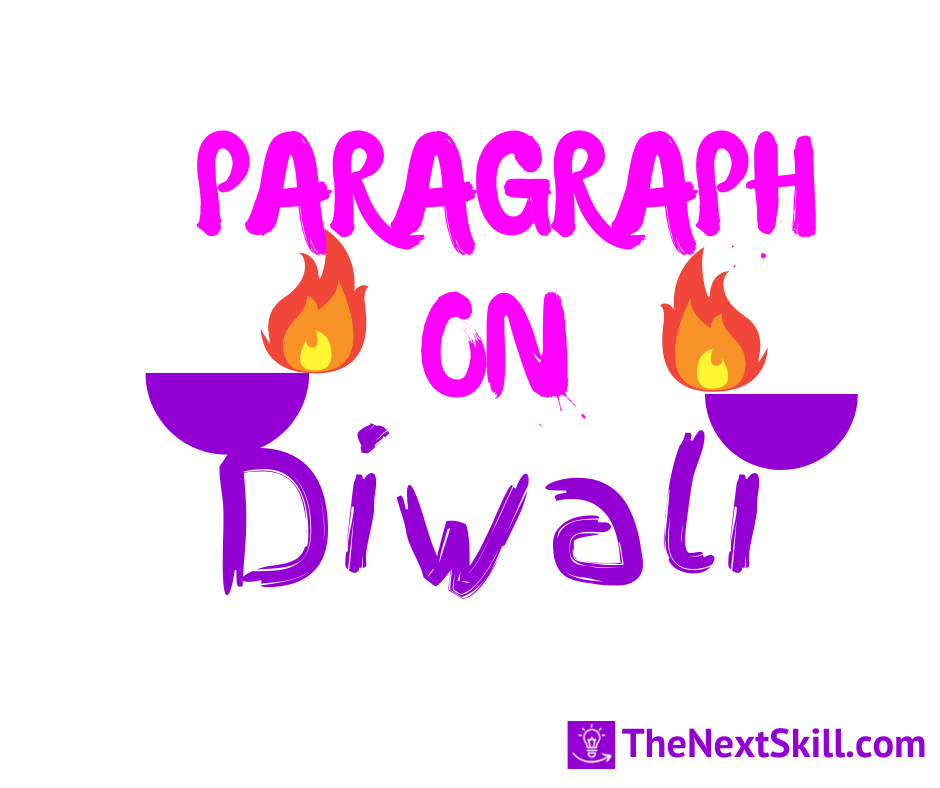
Related Posts

Leave a Reply Cancel reply
Your email address will not be published. Required fields are marked *
Save my name, email, and website in this browser for the next time I comment.

- Vishal's account
Essay On Diwali in English – Long & Short Essay For Students And Children
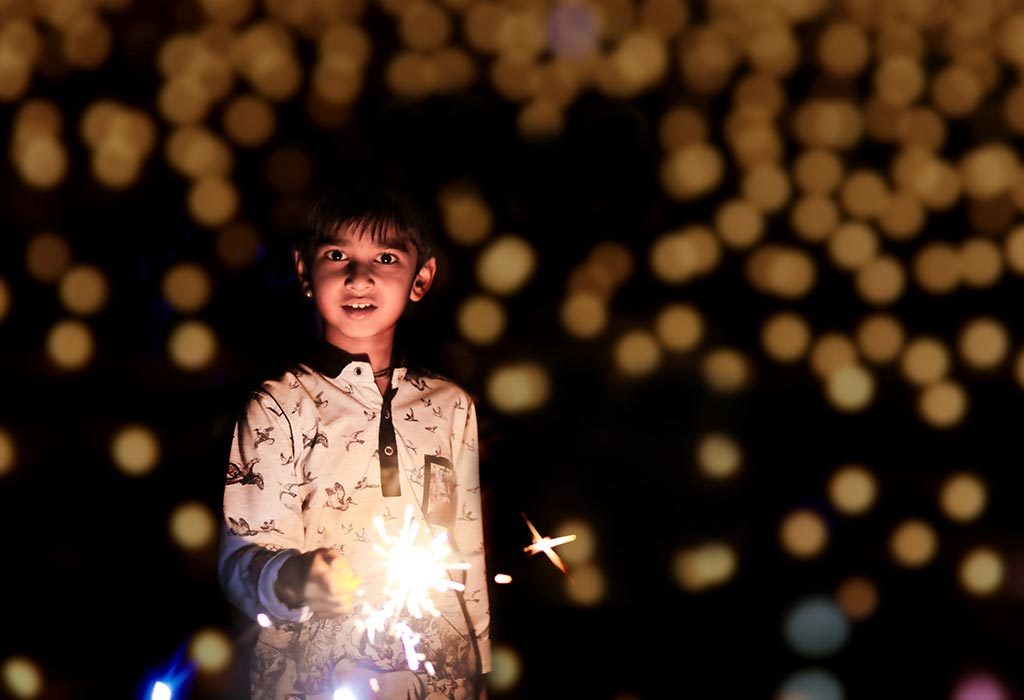
10 Lines on Diwali for Kids
Paragraph on diwali, short essay on diwali in english in 150 words, long essay on diwali, essay on eco friendly diwali or green diwali, important tips for kids to write diwali essay.
Diwali, also known as Deepavali, is a wonderful, festive time for Indians. Traditionally a Hindu festival that celebrates the victory of good over evil, Diwali has now become a national Indian festival that is commemorated in every household of all communities and religions.Diwali presents a hoard of creative opportunities for both kids and adults. Be it making paper lanterns, drawing beautiful rangolis, cooking delicious dishes, or making and writing cards and wishes, there’s something for everyone, especially your little one!
Your child’s school may take this festive period as a chance to set a Diwali essay for students and children. Or if you’re living with a bunch of energetic little kiddos, you can organize a writing activity that revolves around Diwali in English. It will keep them happy and occupied, and have them use their boundless imagination and growing knowledge. Let’s dive into how kids can write an essay on Diwali in english!
Read through these ten lines on Diwali in English that are easy for kids to understand and recreate. For more insights here are few lines on diwali joyous festival, let’s explore further!
- Diwali is the Festival of Lights.
- It is also called Deepavali.
- It is celebrated by Indians all over the world, and by Hindus in countries like Sri Lanka, Malaysia, Singapore, Fiji, and Guyana.
- Though traditionally a Hindu festival, it is now celebrated nationally in India by people of all religions.
- Diwali is historically associated with the victory of good over evil, when Lord Ram defeated the demon king Ravan, and came back home to Ayodhya.
- The festival is called Diwali or Deepavali because it signifies the rows of lamps that the people of Ayodhya lit for the return of Lord Ram.
- The festive period lasts for five days.
- Laxmi Pujan is the main day of Diwali, when Laxmi, the Goddess of wealth and prosperity, is worshipped.
- In the present day, Diwali is usually celebrated by lighting diyas, drawing rangolis, cooking traditional snacks and desserts at home, and exchanging gifts and wishes with family members.
- It is a period of love, light, joy, and unity for many families.
The following short paragraph on Diwali is no more than 150 words, and can inspire a Diwali essay for 2 nd class students:
Diwali, the Festival of Lights, is a nationally-celebrated festival in India. It is traditionally a Hindu festival, but today, Indians of all religions come together to celebrate this popular festival. Historically, Diwali was commemorated when Lord Ram came back home to Ayodhya after defeating the demon king Ravan, and the people of Ayodhya lit rows of lamps for his return. Now, many households light diyas, lanterns, and lights in their homes. Other Diwali rituals include cleaning the house, preparing homemade snacks and sweets, drawing colourful rangolis, and buying and wearing new clothes. Laxmi Pujan is the main day of Diwali, on which families come together to worship the Goddess Laxmi. After that, family members exchange gifts and wishes, and sit down together for a home-cooked meal. It is a wonderful time for many households, as Diwali brings love, light, and unity.
Diwali, often referred to as the Festival of Lights. This short essay on diwali in 150 words will take you on a delightful journey to explore the magic of Diwali from a child’s perspective.
Diwali, also known as the Festival of Lights, is a super fun time for kids like us! It usually comes around when the leaves start falling, and the air gets a bit nippy. Diwali is special because it’s like a huge sparkle-fest! Houses get dressed up with tiny, twinkling lamps called diyas. They make everything look like a fairy tale!
We also get to make colourful designs called rangolis at our doorstep. Different people celebrate Diwali for different reasons. Some say it’s when a brave hero named Lord Rama comes back home after a big adventure. Others believe it’s a day to remember a wise teacher named Guru Hargobind Ji.
During Diwali, we eat lots of yummy sweets, exchange cool presents, and light up the night with awesome fireworks that paint the sky with various colours. It’s like a grand celebration where everyone is smiling and having a blast! Diwali teaches us to be kind, share our joys, and be thankful for all the good things we have. It’s a time for love, laughter, and spreading happiness with friends and family!
Check out this long Diwali Festival essay in English to understand how to incorporate essay writing guidelines into your storytelling.
For many households in India, the word “Diwali” is associated with lights, traditional foods, and family gatherings. Every Diwali, we look back on previous years and recall with fondness how we put up the same lights in the windows and the balconies, what clothes and dresses we wore, what sweets we had prepared and loved, and how our cousins and relatives had come to celebrate the Festival of Lights with us.
Diwali is a festive period that is precious to Indians in India and around the world, and to Hindus in different countries like Sri Lanka, Malaysia, and Singapore. The word Diwali or Deepavali signifies the rows of lamps and lights that the people of Ayodhya had lit in honour of the return of Lord Ram after his victory over the demon king Ravan. Thus, Diwali is historically and traditionally a Hindu festival. However, for a long time, it has been celebrated by Indians of all religious groups and communities. Now, it is the national festival of India.
The festival of Diwali lasts for a total of five days. Each day has its own importance and significance. The first day is celebrated as Dhanteras, when family members clean the house together, throw out or donate old objects and clothes, and shop for new clothes or jewellery. The second day is Naraka Chaturdashi, which symbolizes the slaying of the demon Narakasura by the Goddess Kali. It is on this day that diyas, lanterns, and lamps are lit, and rangolis are drawn. However, some households do this a few days prior as well.
The third day is Laxmi Pujan, which is the main day of Diwali. On this day, Laxmi, the Goddess of wealth and prosperity, is worshipped. Families come together for the prayers and a home-cooked spread. The fourth day is Govardhan Pujan, and it signifies the way Lord Krishna saved his devotees from devastating floods and rains. Finally, the last day of this five-day festive period is Bhai Dooj, when brothers visit their married sisters, who pray for their prosperity, and share a meal together. Family and friends exchange gifts during these days.
Food and festivities go hand in hand. Diwali is a time of lots of snacks and sweets, which are either bought from popular stores, or made at home. A typical Diwali food plate consists of different types of laddoos and pedhas, fried snacks, and dry-fruit trail mixes. Fresh fruits, vegetables, lentils, and grains make up the main meals of the days. It is tradition for families to eat together, as it supports the theme of unity and joy around Diwali.
Nowadays, the celebration of this five-day festival differs among households. Some families choose to celebrate all five days, while some only observe the days of Naraka Chaturdashi, Laxmi Pujan, and Bhai Dooj. A few others only practice Laxmi Pujan, but keep their diyas and lights on for the entire festive period. Our country is very diverse, and so there is bound to be a difference in how our festivals are celebrated.
Another trend that is taking place is the practice of an eco-friendly Diwali. This means that there is limited or no bursting of firecrackers, and there is usage of organic and non-toxic rangoli paints and powders. Family members and friends also gift each other plants, saplings, and seeds, instead of clothes or other objects.
The festive days of Diwali are a well-loved time for Indian families, and every year, we look forward to them eagerly. We enjoy putting up lights together as a family, eating sweets, buying new clothes, and meeting our cousins, aunts, and uncles!
The following eco friendly diwali essay can help kids write an essay on Deepavali around an environmental theme, which will definitely impress both teachers and relatives!
Diwali is a well-loved festive period for Indian families. It is a time when family members come together to clean the house, light diyas, and make creative rangolis. It is also the time when lots of crackers are lit and burst, toxic paints and rangoli colours are used, and plastic waste is generated. Due to the worsening environmental conditions in our country and around the world, it is our duty to celebrate our festivals in a manner that is eco-friendly and not harmful to our natural surroundings.
Firstly, we should not light and burst firecrackers, as they release smoke and harmful chemicals into the atmosphere. Even though they look very pretty, their chemicals cause air pollution, and their bursts cause noise pollution. Both of these have adverse effects on animals, trees, children, senior citizens, and even buildings.
Secondly, we should use biodegradable earthen diyas, and organic powders and paints, so that they won’t pollute the soil and water, or harm the skin of humans and animals. For gifts, we can exchange plants and seeds with friends and family, and encourage each other to follow an eco-friendly lifestyle for a happy and pollution-free Diwali.
There are certain basic tips that apply to most kinds of essay writing for kids. Help your child follow these guidelines to structure and write a classic Diwali festival essay
1. Do your research
Thorough research is the first step to writing a good essay! Help your child research the topic of Diwali on the Internet, in books and magazines, and through personal stories and experiences.
2. Create a structure
An essay, or a story, usually has a distinct beginning, middle, and end. In other words, there must be an introduction, a main body of content, and a conclusion. The introduction and conclusion are usually one paragraph each, while the main body has about two to three paragraphs, detailing various points of information.
3. Have a strong introduction
Your introduction determines how the rest of your essay is perceived. A strong start to your story will immediately captivate your reader, and set the pace for the rest of the essay. Don’t be afraid to take your time to come up with a good introduction to your wonderful story. You can open with a personal anecdote or a few historical facts.
4. Talk about how Diwali is celebrated
This is the most important part of the essay, which will be incorporated in the middle, or main body. In two to three paragraphs, you can talk about why Diwali is celebrated, how different households, communities, and religious groups in our country celebrate the festivities, what the days, customs, and rituals are, and what importance they hold.
5. Add some points about an eco-friendly Diwali
Environmental care during festive periods is now a major factor to be addressed. You can talk about using organic rangoli powders, sustainable lights, earthen diyas, and non-toxic paint. You can also write about why we should not light firecrackers, and the adverse effect of air and noise pollution on the Earth.
6. Put in a personal touch
To make your essay solid and strong, adding personal touches always helps! You can put in a few lines about how you and your family celebrate Diwali, your favourite foods, meeting and playing with your cousins, or perhaps even an interesting incident that occurred during the festive season.
7. Keep it short and sweet
In other words, don’t ramble on, as that can get tedious to read, and also to write! Write your essay to the point, and eliminate unnecessary details to make it crisp and a delight to read.
Diwali celebration essay writing for kids is a wonderful activity to keep them engaged and occupied, while also helping them to strengthen their writing skills, imagination and creativity, and overall cognitive abilities. Have fun together this festive season!
Amazing Diwali Gift Ideas for Kids Significant Facts About Diwali for Kids Fun-Filled Diwali Activities and Games for Kids
- RELATED ARTICLES
- MORE FROM AUTHOR

20 Beautiful Fall Poems For Kids

10 Tips to Get Your Child Ready for Kindergarten
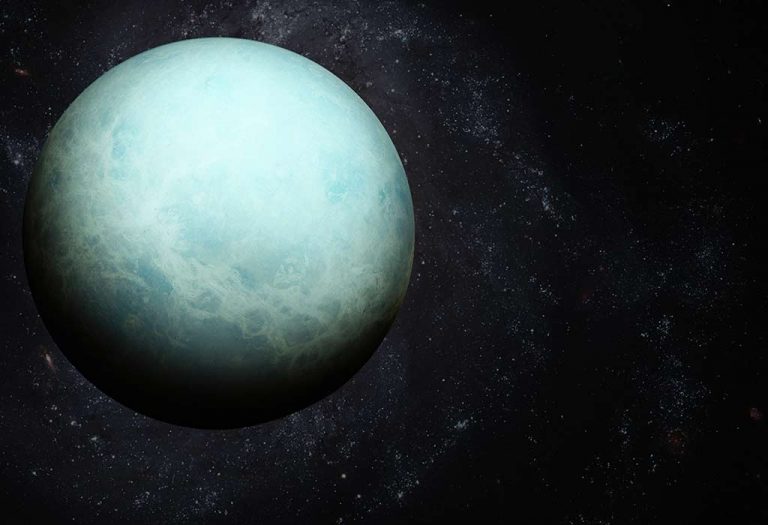
Fun Facts About Uranus for Kids
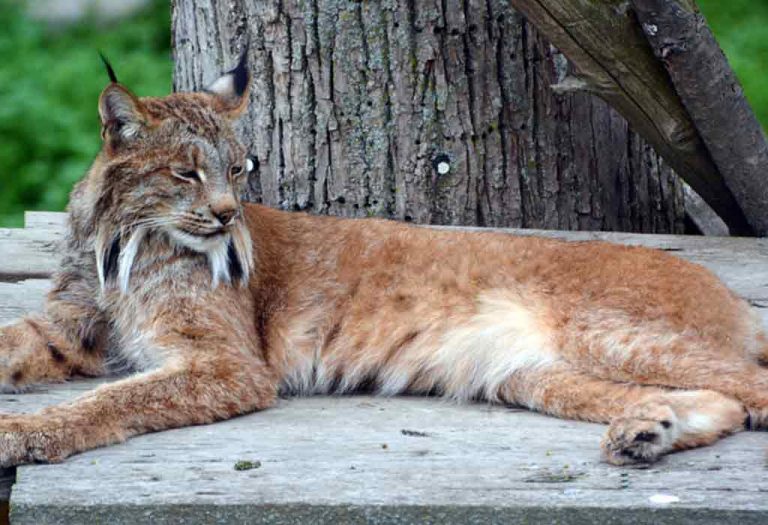

Surprising Bobcat Facts for Kids
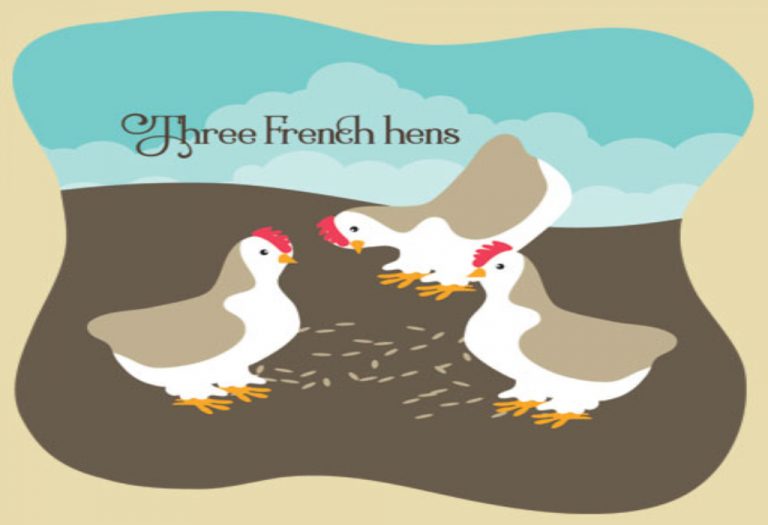
Famous Poems about Animals for Children

15 Lovely Spring Poems For Kids
Popular on parenting.

245 Rare Boy & Girl Names with Meanings

Top 22 Short Moral Stories For Kids

170 Boy & Girl Names That Mean 'Gift from God'

800+ Unique & Cute Nicknames for Boys & Girls
Latest posts.

Happy Father's Day Animated GIF Images to Share

Spiderman Coloring Pages - Free Printable Pages For Kids

Hamster Coloring Pages - Free Printable Pages For Kids

Understanding Baby Food Labels - Easy Guide for Parents on How to Read & Use

Essay on Diwali in English
Diwali, also known as Deepavali, is one of the most celebrated and significant festivals in India. This essay will argue the cultural and spiritual importance of Diwali, shedding light on its history, customs, and the joy it brings to millions of people across the country.
Historical Significance
Diwali has deep historical roots, dating back thousands of years. It is celebrated to commemorate the return of Lord Rama to Ayodhya after defeating the demon king Ravana. The lighting of lamps symbolizes the triumph of light over darkness, good over evil. This historical significance resonates with millions, making Diwali a spiritually profound festival.
Cultural Diversity
India is a land of diverse cultures, languages, and traditions. Diwali is celebrated by people of various religions, including Hindus, Jains, Sikhs, and Buddhists. This cultural diversity is a testament to the festival’s inclusivity and its ability to bring people from different backgrounds together in celebration.
Rituals and Traditions
Diwali is marked by a series of rituals and traditions. People clean and decorate their homes, light oil lamps (diyas), and create colorful rangoli designs at their doorsteps. Fireworks and crackers illuminate the night sky, adding to the festive atmosphere. The exchange of gifts and sweets is a common practice, strengthening bonds between family and friends.
Spiritual Significance
Beyond its cultural aspects, Diwali holds profound spiritual significance. It is a time for individuals to reflect on inner light and spiritual awakening. Many people visit temples, perform prayers, and seek blessings for a prosperous and harmonious life. The festival promotes inner peace and enlightenment.
Economic Impact
Diwali has a significant economic impact in India. It is a peak season for businesses, as people shop for new clothes, jewelry, gifts, and sweets. The demand for goods and services surges, providing a boost to the economy. This economic activity generates income for millions of artisans and traders.
Environmental Concerns
While Diwali is a time of celebration, it is also associated with environmental concerns. The bursting of fireworks and crackers leads to air and noise pollution. In recent years, there has been a growing awareness of the need to celebrate Diwali in an eco-friendly manner. Many individuals now opt for eco-friendly fireworks or refrain from using them altogether.
Community Bonding
Diwali fosters a sense of community and togetherness. It is a time when neighbors come together to celebrate, exchange sweets, and light lamps. Communities organize cultural events, such as dances and plays, to commemorate the festival. This communal spirit strengthens social bonds and promotes unity.
Expert Opinions on Diwali
Experts in cultural studies emphasize the significance of Diwali in preserving India’s rich cultural heritage. They highlight how the festival serves as a bridge between tradition and modernity, allowing younger generations to connect with their roots. Diwali is seen as a symbol of India’s unity in diversity.
Conclusion of Essay on Diwali in English
In conclusion, Diwali is more than just a festival of lights; it is a celebration of history, culture, spirituality, and togetherness. Its historical significance, cultural diversity, and spiritual importance make it a cherished festival for millions of people in India and around the world. While it has economic implications and environmental concerns, the essence of Diwali lies in its ability to bring people together in joy and unity. As experts emphasize, Diwali is a testament to India’s rich cultural heritage and its timeless traditions that continue to resonate with people of all ages.
Also Check:
500+ Words long Essay on Technology
Talk to our experts
1800-120-456-456
- Diwali Celebration: No Bangs, Just Bliss
A Sparkling Diwali: Shine Bright with Eco-Friendly Celebrations
Welcome, young champions of a cleaner and greener planet! As we gear up for Diwali 2023 , the Festival of Lights, there's a magical twist we're about to explore - celebrating Diwali without those noisy, smoky crackers. It's time to light up our lives and the environment in a more eco-friendly way! So, grab your eco-warrior capes, and let's embark on a journey to discover how to celebrate Diwali without crackers while keeping the joy alive.
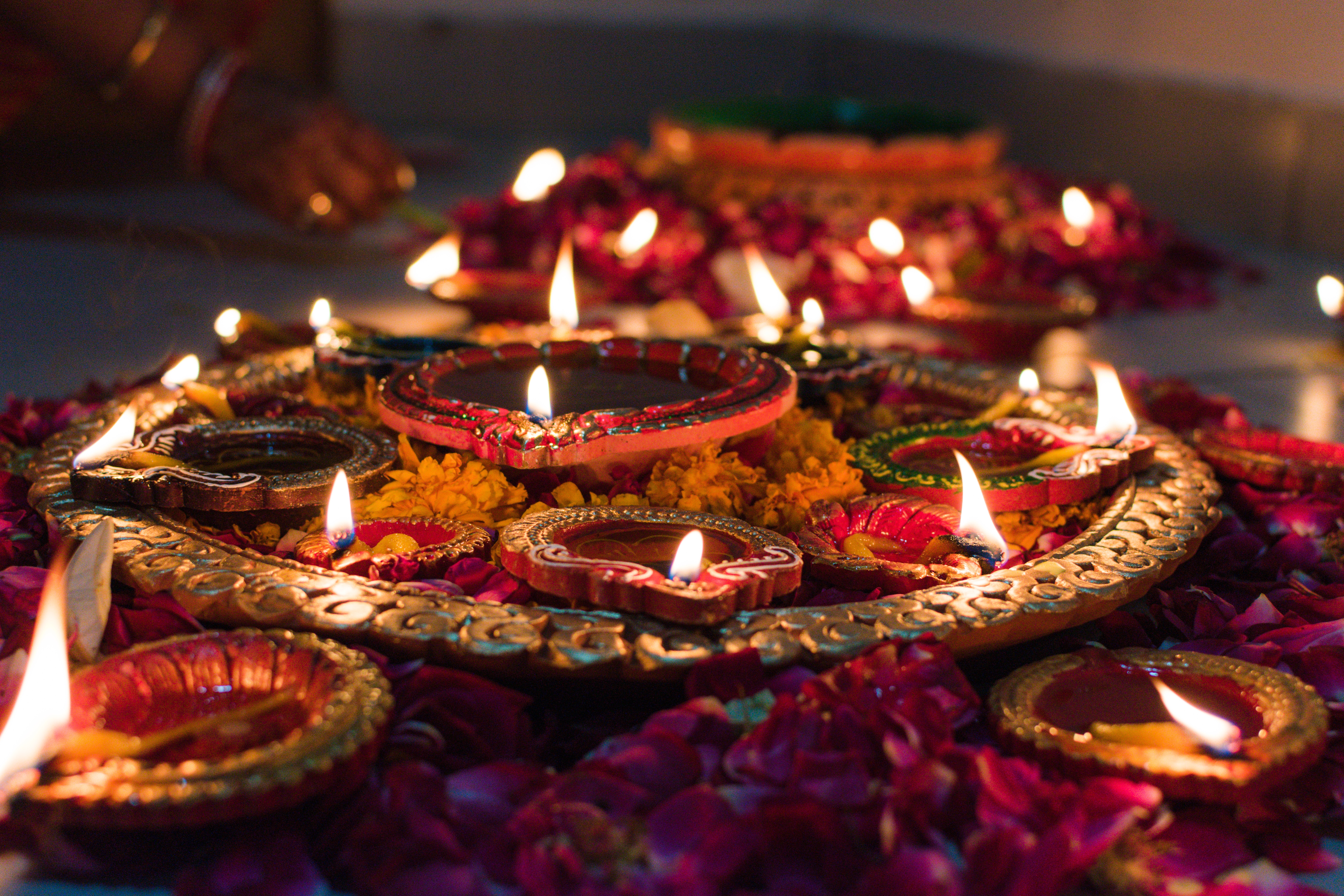
Also Check : Essay on Diwali in English for Students
Diwali: A Glittering Reminder
Before we dive into the non-cracker festivities, let's quickly remind ourselves about Diwali's essence. Diwali, also known as Deepavali, symbolizes the triumph of light over darkness and good over evil. It's a time for families to come together, spread love and positivity, and illuminate their homes with beautiful lights.
When is the Diwali 2023 Date?
Diwali doesn't stick to the same date every year, but it's usually in October or November. In 2023, Diwali falls on Sunday, November 12th. Mark your calendars and let's get ready for a spectacular eco-friendly celebration!
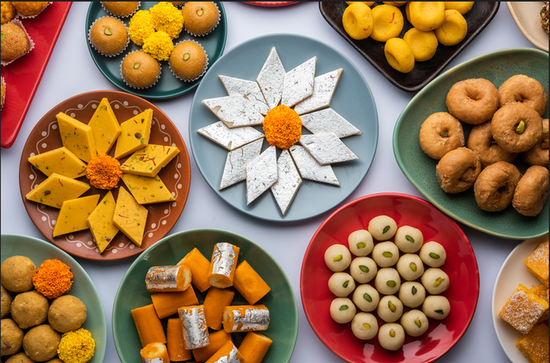
Also Check : Dev Deepawali 2023 - Dates, Rituals and Importance
Diwali Delights: How to Celebrate an Eco-Friendly Diwali?
Decorate your Home: Diwali is all about adding color and sparkle to your surroundings. Instead of crackers, get creative with decorations. Make beautiful rangoli patterns using colored rice, sand, or flower petals. It's like creating your magical art installation!
Diya DIY: Diyas, or oil lamps, are stars of the Diwali show. You can create your own colorful, personalised diyas with some clay, paint, and a pinch of creativity. These little lamps can light up your home just as beautifully as fireworks light up the sky.
Sweets Galore: Diwali is the time for some serious sweet indulgence. Instead of investing in firecrackers, invest your time in making delicious sweets with your family. You can try your hand at making ladoos, jalebis, or any of your favorite treats. Trust us It's a sweet experience!
Community Bonding: Organise a friendly, eco-friendly Diwali get-together with your neighbors. You can share food, stories, and laughter. It's a brilliant way to celebrate and strengthen community bonds.
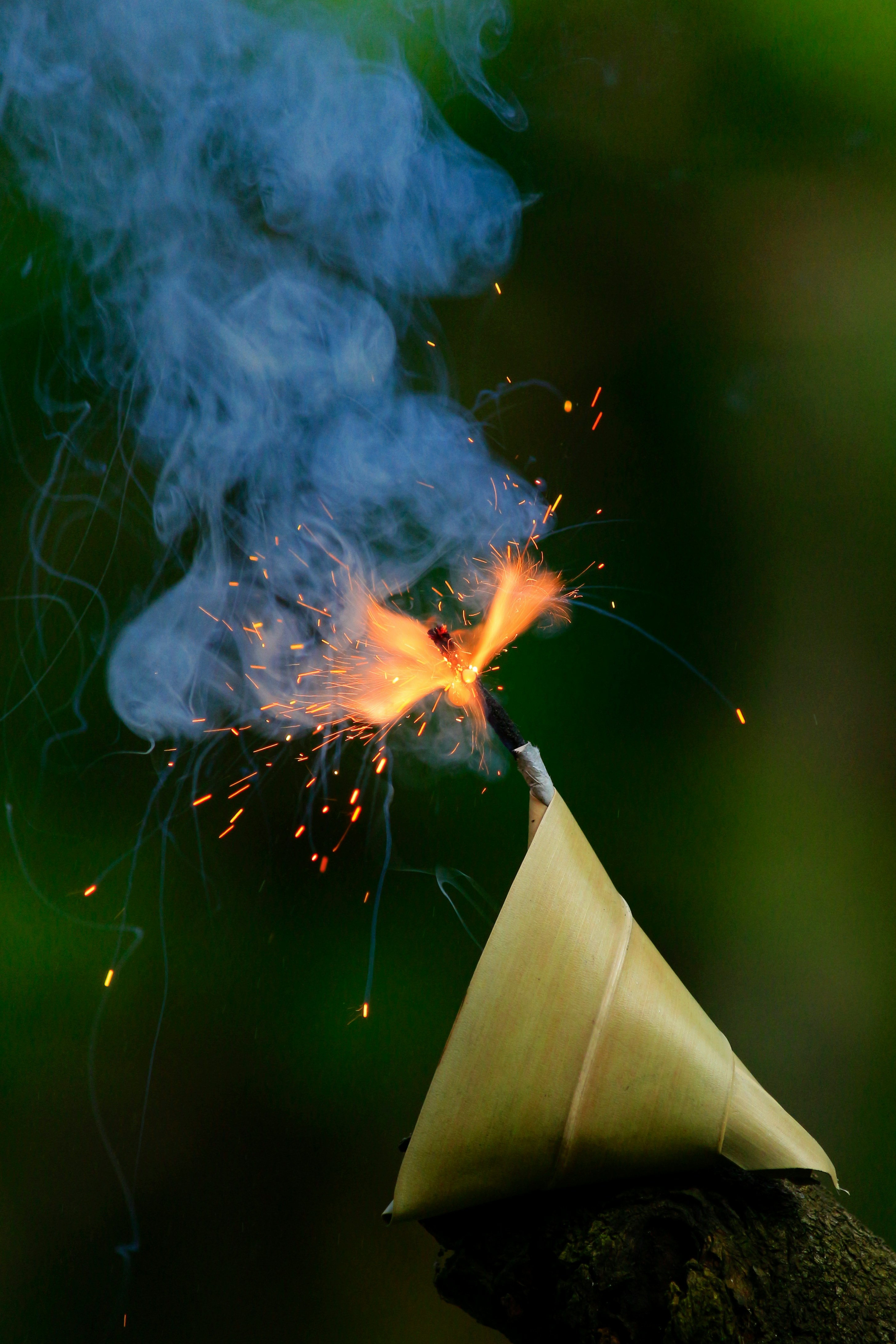
Also Check : Learn These Pollution-Free Paper Crafts for Diwali
What are Some Eco-Friendly Initiatives you can Take this Diwali?
Green Gifting: Instead of exchanging firecrackers, exchange thoughtful, eco-friendly gifts. How about gifting a potted plant to a friend or family member? It's a gift that keeps on giving, just like the joy of Diwali.
Spread Light, Not Noise: Gather your friends and create a 'Noiseless Diwali' campaign. Pledge to avoid noisy firecrackers and, instead, light up your neighborhood with beautiful, noise-free lights. You can even organise a contest for the most creatively lit house!
Eco-Friendly Diwali Cards: Design and send out eco-friendly Diwali cards to your loved ones, reminding them to celebrate without crackers. You can even add a touch of personalisation by writing a heartfelt message inside.
What are the Benefits of an Eco-Friendly Diwali?
Cleaner Air: By avoiding firecrackers, you're helping to keep the air clean and reduce pollution. That means we all get to breathe easier during the festive season.
Safe Celebrations: Eco-friendly celebrations are much safer. You won't have to worry about firecracker accidents or the safety of your furry friends.
Eco-Warrior Status: Celebrating Diwali without crackers makes you an eco-warrior, and that's something to be proud of. You're playing your part in protecting our beautiful planet.
Joyful Atmosphere: Diwali is about spreading happiness and positivity. An eco-friendly celebration keeps the focus on these values rather than loud noises and smoke.
Diwali Puja Time 2023: Let's Make It Special
Diwali isn't just about lights and sweets; it's also a time for reflection and gratitude. You can enhance your Diwali puja by:
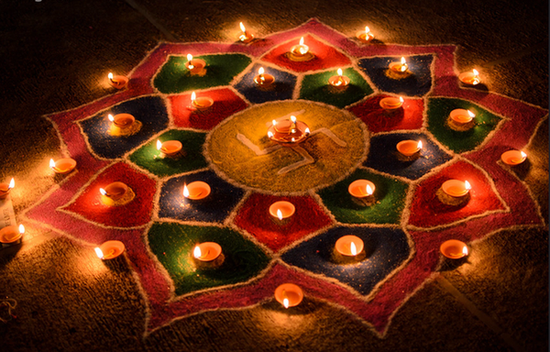
Setting up an eco-friendly puja with reusable items.
Decorating your puja area with flowers, colorful clothes, and handcrafted items.
Offering homemade sweets and sharing them with your family.
Diwali without crackers isn't just possible; it's a fantastic way to celebrate. It's a chance to fill your home and heart with light, love, and laughter without causing harm to our planet. So, this Diwali, let's sparkle with eco-friendly celebrations and become eco-warriors for a brighter, cleaner, and happier world. Wishing you all a joyful and "cracker-free" Diwali in 2023!
FAQs on A Sparkling Diwali: Shine Bright with Eco-Friendly Celebrations
1. How to wish Diwali without crackers?
Exchange heartfelt greetings with loved ones, send warm Diwali messages, or share thoughtful Diwali-themed gifts.
2. How to make cracker cracker-free Diwali festival?
Light up your home with diyas and rangoli, engage in family bonding activities, indulge in traditional delicacies, participate in cultural events, or offer support to local causes.
3. Is it necessary to celebrate Diwali with crackers?
No, crackers are not an essential part of Diwali. The festival's essence lies in joy, togetherness, and illuminating darkness.
4. How can we celebrate a happy Diwali without pollution?
Use eco-friendly alternatives to crackers, light up with energy-efficient LED diyas, opt for public transportation, choose sustainable gifts, and be mindful of waste disposal.
5. How do I celebrate eco-friendly happy Diwali at my home?
Cleanse and decorate your home, light up diyas and create rangoli, prepare traditional delicacies, gather for storytelling and games, and exchange gifts.

How to celebrate eco friendly Diwali (Includes 10 lines on Green Diwali essay for kids)
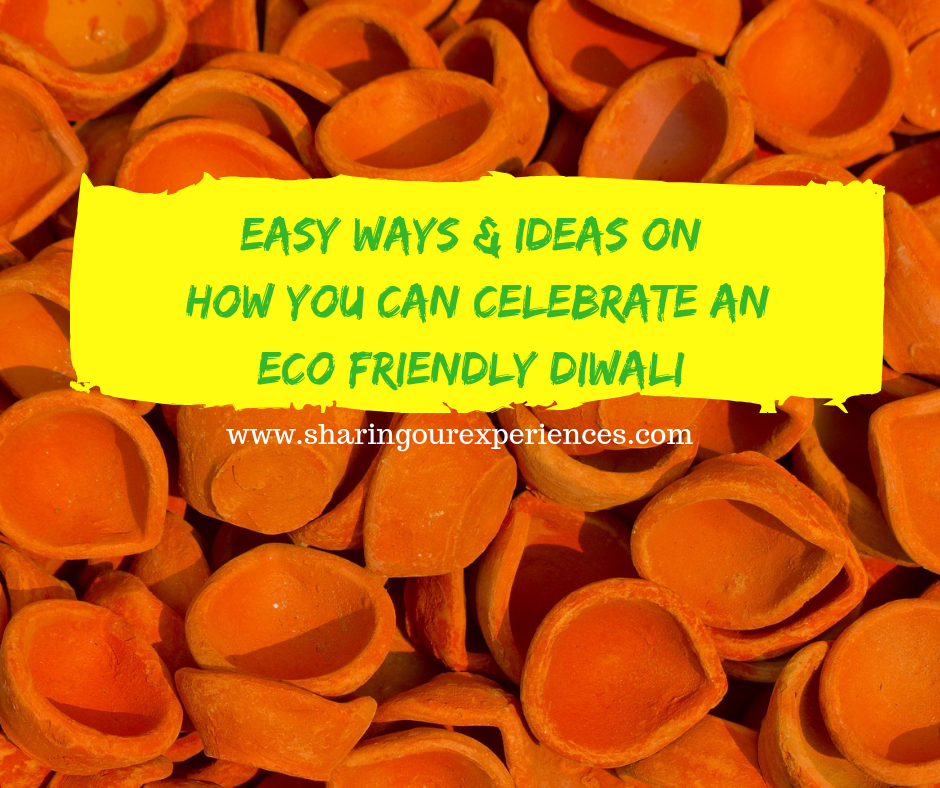
Looking for how to celebrate eco friendly Diwali? Here are some easy tips and ways to celebrate eco friendly Diwali with your kids. This can also be used to write an essay for ’10 lines on Green Diwali’
This is becoming increasingly important and essential with rising pollution levels every year and quality of air worsening after festivals. If you are wondering how do you celebrate eco friendly Diwali then you can follow these easy tips to celebrate Diwali in a responsible way.
Diwali the festival of lights also called Deepavali is widely celebrated by people across our country with joy. It’s time to meet friends, family get-together and celebrations. Read more about the significance of Diwali and why Diwali is celebrated in India .
Though over the years, this festival has put a lot of pressure on living standards. As soon as the celebrations begin, people indulge in spending, shopping and wasting a lot all through this joyful time.
Children learn from what we the elders are doing. For them the meaning of festival will be what we show them. So why not teach them the real meaning of Diwali by making some positive change in the way we celebrate the festival that benefits everyone and leads to a healthier tomorrow.
And in today’s world it has become essential for us to take some small steps to create a healthy environment for our kids to grow up. So check some easy ideas below and have a safe, happy and prosperous Diwali.
Few Green Diwali ideas and ways – How to celebrate eco friendly Diwali
[wpsm_toplist]
Here are some Tips and ways to celebrate an eco-friendly Diwali with kids. Read Ideas to celebrate Eco Friendly Diwali this year, get some tips on how Diwali without crackers can also be a blast. We need to teach our kids ways to celebrate eco-friendly Diwali which do not harm Mother Nature. Check out how to celebrate Green Diwali with kids
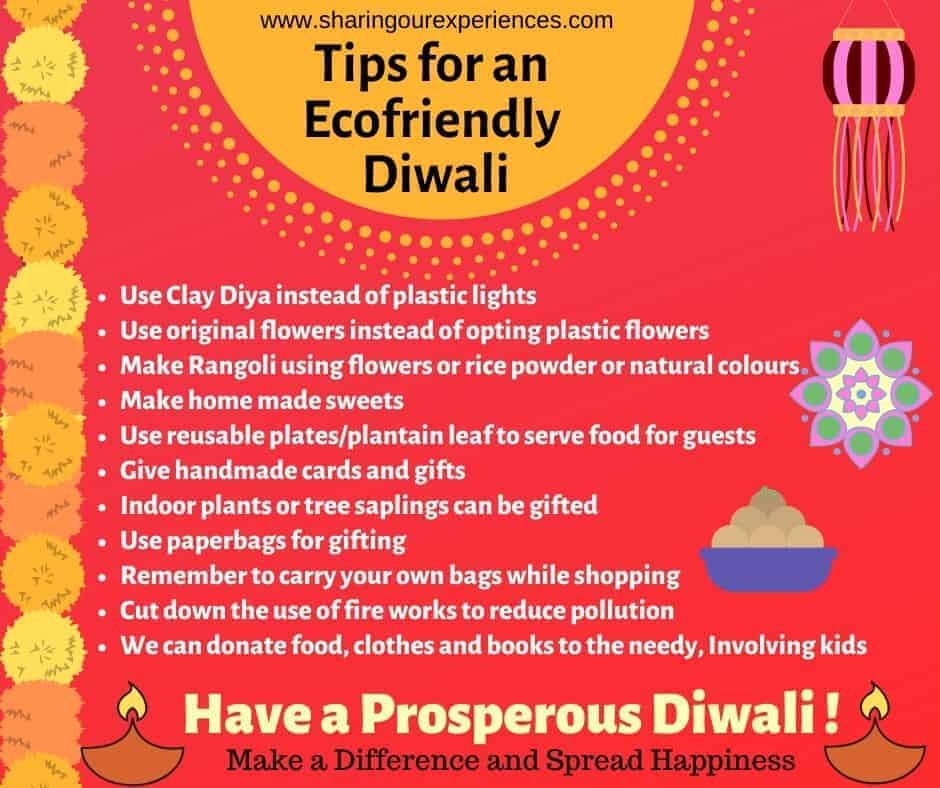
Making Rangoli using flowers or rice powder or natural colours
Earthen diya’s instead of wax candles, diya instead of electric lighting, decorate your home using handmade home decor, give handmade gift, make your diwali cards, arrange events, other fun activities for kids to cut down on burning crackers, get indoor plants or plant a sapling in your society, give back to the society.
We decorate the entrance of our home with beautiful Rangoli.
Nowadays some people usually stick paper stickers of Rangoli instead of drawing one. But in the earlier days drawing Rangoli was for the dual purpose one for decoration and another to feed ants and insects as they used to make Rangoli using fine rice powder.
You can also make simple Rangoli using flower petals such as marigold, rose and jasmine.
Involve your kids in filling Rangoli with petals and children will enjoy doing it.
Next days you can clean this and throw it in the compost. This way there will be no harm to the environment.
Make use of earthen diyas instead of Wax candles this Diwali.
As Earthen Diya can be washed and reused and even if thrown they will mix with the soil and won’t harm the mother earth.
Whereas candles are one time used and petroleum based release toxins when they burn that affects the air quality.
We can include our kids in decorating these earthen diya in painting or applying glitters on diya or sticking decorating stickers, an activity that the children will enjoy doing.
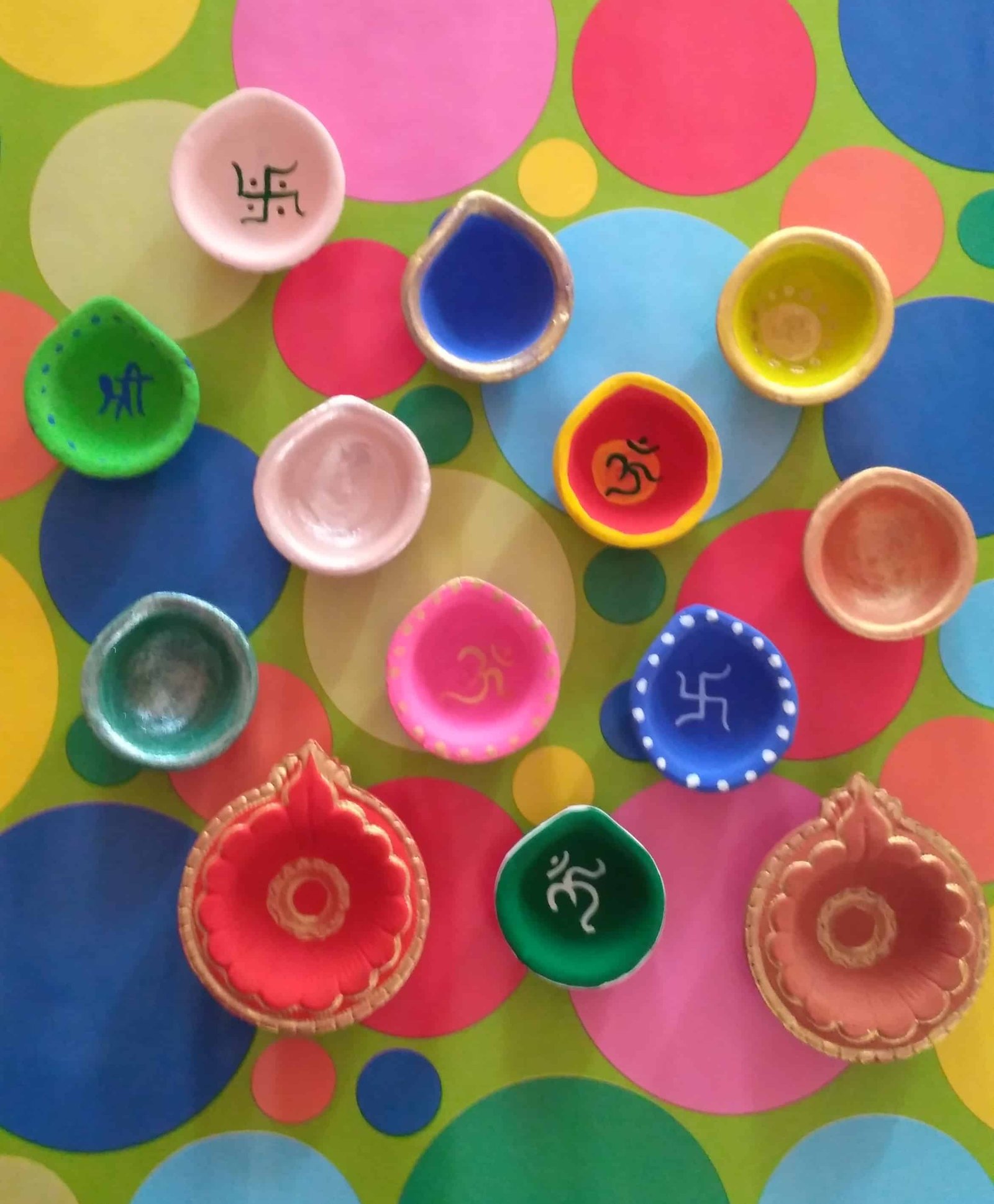
Related – How to decorate earthen Diyas and other Diwali activities and crafts for kids
Using earthen diya not only reduces pollution but also acts as helping hand for a poor if we buy from a needy potter instead of big mall.
Using earthen lamps reduces the consumption of electricity thus saving on electricity bill.
Go for LED lights if at all you want to use electric lighting as it saves considerable amount of energy.
You can also make handmade Diwali paper lamps. Read step by step tutorial on how make Diwali paper lamp .
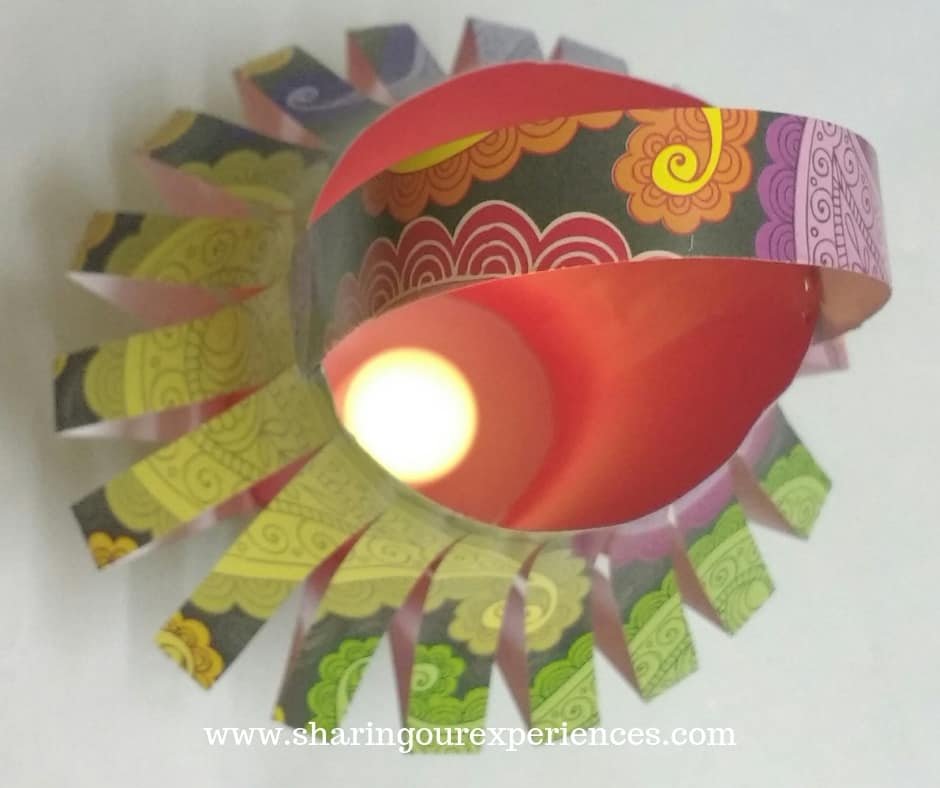
Rather than buying plastic flowers we can make our own paper flowers.
We can use Paper quilling or popsicle sticks to make handmade lamp shades. We can make clay to make wall hangings. There are multiple ways on how we can make decorations at home or recycle and reuse things we have available.
Related – How to make paper flowers and step by tutorial to make paper roses, How to make Clay wall hanging , How to make Clay urli pot , How to make Paper luminaries

If you are passionate about giving and receiving gifts then why not try some handmade gifts items?
You can choose gifts that are made of natural material such as jute, recycled cloth bags and paper flowers, cloth purse, toys made of bamboo for kids etc.
I bought a plate, glass, bowl, fork and spoon made of bamboo for my niece and he loved it. He says he loves eating in that plate.
How to make handmade lamp shades
How to make handmade wall hanging
How to make your own Paper bag
Instead of giving expensive gifts if possible make greeting cards with the materials available at home and personalise it using stickers.
You can make goddess Lakshmi footprints on card using haldi – kumkum available at home.
Making greeting cards with children will be a memorable activity for the kids as they can make cards for their cousins and friends. They can make use of ribbons, bindis, leaves and stickers to decorate the card as they wish.
Stay traditional and go eco-friendly this Diwali, instead of using expensive crockery for parties use banana leaves and clay glass to serve the guests.
You can also organise a community events both for kids and grownups.
Few options are:
- Paper lanterns making competition for children
- Flower arrangement competition
- On the spot Sweet making competition
- Rangoli competition
- Cooking without fire for kids
- Arrange puppets show, talents show, cultural and music competitions.
- Dance party is better instead of loud and polluting crackers this Diwali
These days the market is flooded with environment friendly cracker but still they pollute the air. So why not give a miss to firecrackers this Diwali and try something new!
- Children can collect dry leaves, twigs and grass from nearby parks, put a bonfire and sing, dance surround the fire to celebrate Diwali with sweets and soft drinks along with family and friends.
- To make cheerful sound this Diwali, children can blow brown paper bags and jump to burst them. This will not only make children happy but also fill them with joy doing it with their friends.
If you do play with crackers, please stay safe. You may want to check out some easy tips on how to have a safe Diwali with kids .
For making air quality better and combating pollution, you can plant trees and plants. To start with get an indoor plant for your balcony as it purifies the air we breathe in.
Related – Best Air purifier plants in India for your home

Instead of bursting cracker and spending thousands of rupees on fireworks, we can donate food, clothes and books to the needy and the poor.
By involving children in this activity we can teach them to give back to the society and create a sense of giving and sharing in them.
After all Diwali means sharing and spreading happiness.
Liked this post ?
You may also want to read all Related posts on Diwali
Diwali gift ideas for kids
How to make a Diwali paper lamp
Tips for Safe Diwali for Kids
Why do we Celebrate Diwali in India – how to explain significance of Diwali to kids
Diwali activities and crafts for kids
Handpicked Durga Puja and Dussehra books for kids
I f you liked this article on ecofriendly Diwali Don’t forget to Pin it
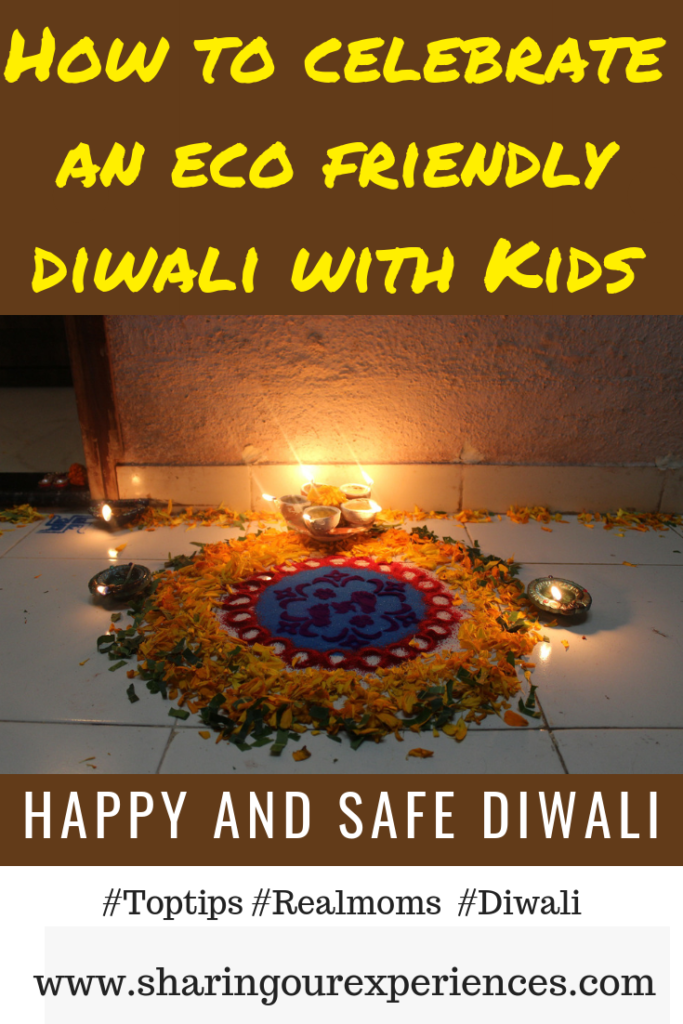
Your Turn Now
In case if you liked this article on eco friendly Diwali festival and think it may help someone do show your support by sharing this article.
Like our Facebook Page and Stumble It!
Add a comment – Green Diwali ideas
Did you like these tips on how to celebrate an eco friendly Diwali? Do let us know using comments below. Would love to hear from you.
Tags – green Diwali ideas

Why do we celebrate Diwali in India - How to explain the significance of Diwali to your child

How to make DIY Paper Kandil for Diwali
Mom of an active energetic kiddo who is going to be 4. Love writing about what I learn during my journey of mommyhood. Love gardening and reading books

Dive into Creativity at Axis Bank Splash 2023-24: Unleash Your Talents in Drawing and Craft!

How to play Happy birthday on the piano, keyboard, casio, or synthesizer (Easy Tutorial)
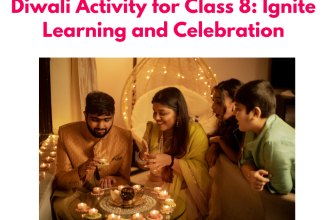
Diwali Activity for Class 8: Ignite Learning and Celebration

15+ Creative Freedom Fighter Fancy Dress Ideas for Boys!
Leave a reply cancel reply.
- Free worksheets
- Early Childhood Education
- Parenting Tips
- Kids Activities and Crafts
- Money-Making and Saving tips
- Downloadable Worksheets
- Bestsellers
- Sharing our Experiences – Our Story: Get to Know Us Better
- How to earn money FAQs
- Get in Touch: Contact Us Today
- Shipping and Delivery
- Return and Refund Policy
- Privacy Policy

Easter Fun Activity Bundle

Shopping cart
What is the importance of eco-friendly diwali? Write an essay 100 words.
Eco-friendly diwali: celebrating diwali and all other festivals without causing pollution is the direst need of the hour; if we don’t celebrate them in an eco-friendly way, we may not live to celebrate them for the years to come. all life forms adapt according to the existential challenges and difficulties, man included. man has made his life so complex that he appears to have been lost in the labyrinths he has unwittingly or wittingly woven around himself. one such labyrinth is the labyrinth of environmental degradation. it had never been so critical in the entire history of mankind as it is now. man’s thoughtless and short-sighted approach to life mingled with greed and avarice has brought the entire life on the brink of annihilation. he must change his life-style, traditions, customs, festivals, and general ways of living in such a manner as don’t interfere with the balance of the environment any longer. if he doesn’t, life will cease to exist. keeping the critical state of the environment in mind, diwali celebrations will have to undergo a drastic change. till the present time, diwali is synonymous with pollution-creating practices, such as bursting crackers by millions of people, candles, etc, send tons of toxic smoke into the already polluted environment, which further degrades it. in the 21st century diwali, people will only use electric lights to light their houses. for crackers, some non-polluting alternatives will have to be replaced. crackers that don’t cause any pollution need to be invented. crackers that go up emit light without any smoke. crackers made of laser light can be a good replacement for traditional bangers. other traditions such as worshiping of goddess lakshmi, eating sweets, exchange of gifts, etc., may go on unchanged. that’s how the diwali celebrations may undergo some changes in the days to come let’s pledge to celebrate diwali without causing any pollution for our own and our children’s health and bright future..
Write ten slogans on eco-friendly Diwali.
Write an essay on importance of water in 200 words.

Latest Education and Career News
Eco Friendly Diwali Essay, Quotes, Lines
Reported by Pankaj Bhatt
Published on 1 May 2024
Eco Friendly Diwali essay, Quotes, Lines : The cardinal symbolism of Diwali is the idea of the ascension of light over darkness. To express this ages-old spiritual & religious concept, the festival is celebrated by lighting up diyas, candles and decorative lamps. There is a tradition of celebrating the Festival of lights with family & friends by exchanging gifts, sweets and conversations. Along with all these, there is one major activity that both kids & adults love doing on Diwali, and that is burning crackers and lighting fireworks. While the bright colours of the firecrackers are amusing to the eyes for a while, they cause major environmental problems and health hazards in the long run.
This article is an initiative to promote the eco friendly diwali celebration. Become an Earth Hero today by sharing our Eco Friendly Diwali essay & quotes with your family & friends.
Are you an environment enthusiast concerned by the high levels of pollution made during Diwali every year? Have you been meaning to inspire your family & friends to take a safer approach to celebrate the festival? If yes, this post has all the weapons you will need in your pursuit. Check our essay on Eco-Friendly Diwali and our collection of quotes to send your family & friends.
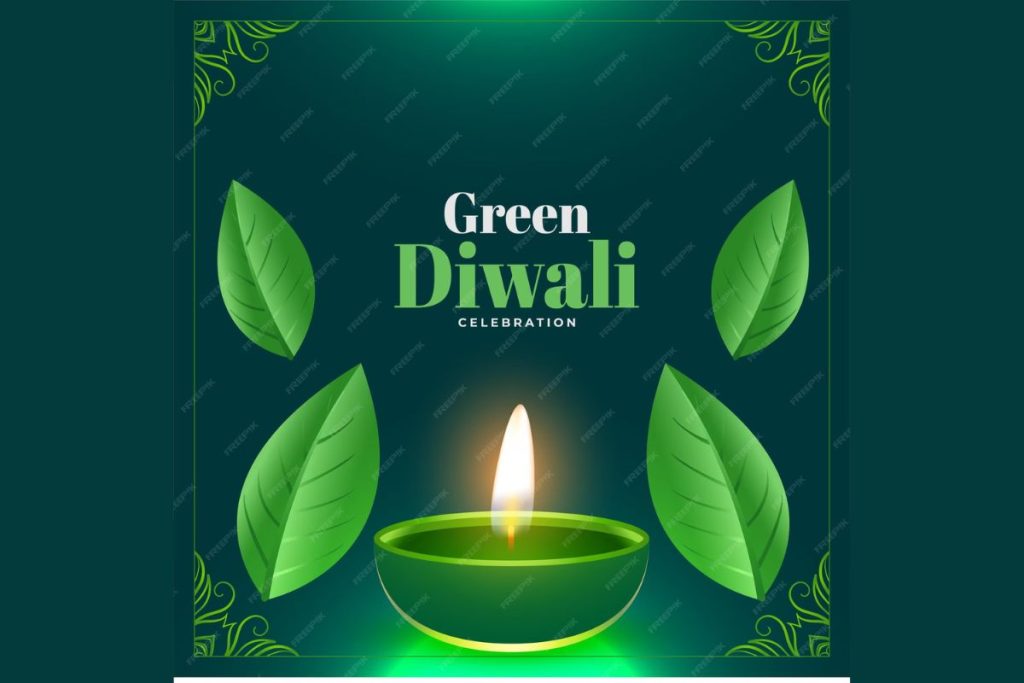
Essay on Eco friendly Diwali
Introduction : Diwali is undoubtedly India’s most significant festival of all time. People across the nation participate in the Festival of light and have a great time with their family & friends. One raging issue that comes up each year right after the Diwali celebration is the heightened pollution levels throughout the country. Air and noise pollution lead to various health hazards, especially for young children and elders. Every year rules are introduced by the government in an attempt to lower the emission levels, but they are not followed very rigorously. Rules don’t make the festival boring. We just need to be creative enough to come up with more ways to celebrate whilst preserving the integrity of our planet.
Eco friendly Diwali celebration : We can avoid buying chemical-based rangoli colours and stick to natural alternatives such as rice powder, flour, flowers, turmeric, colored sand, etc. Instead of excessive candle burning, we can emphasize earthen diyas more since they cause significantly less pollution. We can involve the kids of the house to make decorative items from normal household items such as old discs, hangers, cardboard and much more. LED lights should be preferred for decorations rather than the traditional power-consuming ones.
And the most important one is the lesser use of firecrackers. We should make our kids understand the implications of firecrackers on the environment and limit their usage to a minimum. We can simply start by following the government’s introduced guidelines for a safe Diwali. The waste generated after cracker bursting should also be disposed off carefully as the remnants also possess heavy amounts of toxins in them. We can plan fun group activities instead of lighting crackers, after all, spending time together is what makes the festival special. These activities will set a trademark for others and give birth to brand new Diwali traditions, more inclined towards making memories.
Conclusion : This Diwali, let’s take a creative approach to make the festival stand out and create beautiful decorations together with family & friends. By doing these activities together, the day will turn out to be much more memorable. Let’s take a leap forward to an eco-friendly Diwali and make earth happy.
Eco Friendly Diwali Quotes & Lines
We are sharing our collection of eco friendly diwali quotes with you. Text your loved ones these quotes and messages and show you care about them.
- This Diwali, burn away your stress, not crackers. Have a safe pollution free Diwali.
- Let’s join forces this Diwali and pledge to restore the paradise this earth once was, lets say no to crackers and save our planet.
- Festival of light approaches us once again, filling our hearts with vision of love over hate. Let us flood our mother earth with the same love and avoid using crackers this year.
- When we are kids even playing in the mud gives us the joy of the heavens, then why just stick to burning crackers? Let’s get creative and discover our own new way for an eco-friendly Diwali.
- The real beauty of Diwali is not just the bright light that meets our eyes, it’s the sense of peace & enlightenment we feel in our mind. I wish you a Diwali where your mind and soul shine brighter than ever.
- I kept on burning crackers each Diwali to feel the same joy that I felt as a kid but that never happened. Maybe it was not the burning of crackers but the company of my dear childhood friends I missed. Happy Diwali dear friend, have a good one.
- This Diwali, let’s meet again; let’s sit on the roof and watch the sky be lit again. Not by crackers but the memories of old times let’s ignite a special little fire.
- You don’t need crackers to burn this Diwali, burn away all the bad memories and welcome new ones, full of love, peace and prosperity. Happy Diwali.
- The crackers will only light up your space for an instant but your kindness and compassion will light up forever.
- Who needs to light a cracker when the light of your dreams are enough to make the world shine brighter than ever. Happy Diwali, to my dreamer friend.
We truly hope that these quotes will light up your Diwali even more. Make sure to share these with your loved ones and spread happiness and love. Happy Diwali!
How can I celebrate my Diwali eco friendly?
There are various ways in which you can make Eco Friendly Diwali. For starters, don’t burn crackers, use organic rangoli colours instead of chemical based ones, avoid burning candles and rather stick to earthern diyas, get creative and make best out of waste decorations for your use.
Why is Diwali called festival of light?
The use of the word light in Diwali is the symbolism of the ascension of light over darkness. The word Diwali gets its roots from the Sanskrit word Deepawali, which literally translates to a row of lights.
Pankaj Bhatt
Leave a Comment Cancel reply
Most recent.

Farewell Speech for Colleague | Best Farewell Speech for Students and Children

Farewell Speech for Friends; Speech on Farewell for Colleagues and Friends in English

Speech On the Value Of Time for Students and Children in English

Ideas for Informative Speech Topics; Check some fresh ideas

Good Informative Speech Topics for Effective and Wise Speech Writing

High School Graduation Speech: Speech in English for Students and Children

Welcome to NVSHQ.ORG. Here you will get all the latest information about the trending things on the internet around India. We focus on how to study tips, Exam guides, education, working techniques, case studies, Exam Answers Keys, Exam Admit card articles.
Dehradun, Uttarakhand
Call Us: +91 9997526894

NVSHQ.ORG is part of the Applaud Web Media publishing family.
English that goes straight to the heart
Essay on Diwali
Diwali is the biggest and one of the most famous and light-hearted festivals celebrated by billions of people. It is celebrated with great zeal and enthusiasm throughout India and by also Indians in foreign countries.
Diwali generates belief in good deeds and marks a day of happiness, joy, and the end of evilness.
Daily Test - Attempt Now

Essay on Diwali 200 Words
Diwali, celebrated by billions of people, is India’s grandest and most renowned festival, known for its joyous and vibrant atmosphere. It is widely observed by Hindus and Indians residing in foreign countries. Often referred to as the “Festival of Lights,” Diwali signifies the triumph of good over evil.
Occurring in the months of October and November, approximately 20 days after the festival of Dussehra, Diwali holds immense significance. On this auspicious day, people adorn themselves in new attire. As evening descends, homes are illuminated with tube lights, clay lamps called diyas, and candles, symbolizing the eradication of darkness and the welcoming of gods and goddesses. According to Hindu beliefs, Goddess Lakshmi , the deity of wealth, is said to visit households and bless them with prosperity. To honor this belief, Hindus worship Lakshmi, light candles and diyas at their doorsteps, and leave their doors open as a gesture of welcome.
Diwali is celebrated with unparalleled enthusiasm in every town and city across India, as well as by the Indian diaspora around the globe. It serves as a unifying symbol, bringing people together in celebration. Having been observed for thousands of years, Diwali continues to hold immense cultural and traditional significance in India, enduring as a cherished festival to this day.
Essay on Diwali 300+ Words
Diwali, known as the festival of lights, holds a significant place in India, the land of festivals, owing to its cultural diversity, religious beliefs, and faith among people of different religions. Celebrated by billions of people, Diwali stands as the biggest and most renowned festival in the country. It is observed with immense enthusiasm and fervor across India and by the Indian diaspora worldwide. Diwali, occurring in the months of October and November, typically falls 20 days after the festival of Dussehra and symbolizes the victory of good over evil.
During Diwali, people adorn themselves in new clothes, illuminating their homes with tube lights, clay lamps called diyas, and candles, aiming to dispel darkness and welcome the deities. According to Hindu religious beliefs, Goddess Lakshmi, the goddess of wealth, is believed to visit homes on this auspicious occasion to bestow prosperity. Consequently, Hindus worship Lakshmi, light candles and diyas at their doorsteps, and keep their doors open to invite the goddess.
Diwali brings immense joy and excitement to people’s lives. It fosters a sense of togetherness and strengthens bonds with loved ones. On this day, various homemade sweets are prepared and shared with friends and relatives. Inviting near and dear ones, visiting relatives and friends, exchanging gifts and dry fruits, organizing parties at home or workplaces, dancing, singing, and relishing delicious dinners are all integral parts of the Diwali celebrations.
Being a festival celebrated nationwide, Diwali holds great significance in Hindu mythology and emphasizes the importance of true happiness and tranquility. It represents the triumph of good deeds and signifies a day of joy, happiness, and the eradication of evil. Diwali is observed with extraordinary enthusiasm in every town and city in India and by the Indian diaspora worldwide, serving as a symbol of unity. For thousands of years, India has rejoiced in this festival and continues to do so, preserving its rich traditions and customs.
Essay on Diwali 450+ Words
India, renowned as the land of festivals, showcases its cultural diversity, faith, and religious beliefs through various celebrations. Among these festivals, Diwali stands as the grandest and most renowned, bringing joy and merriment to billions of people. Celebrated with immense zeal and enthusiasm throughout India and by the Indian diaspora worldwide, Diwali, also known as the festival of lights, holds a special place in the hearts of Hindus. This festival takes place in the months of October and November, specifically 20 days after the festival of Dussehra, symbolizing the triumph of good over evil.
Diwali finds its roots in Hindu mythology, specifically the epic tale of Lord Rama, an avatar of Lord Vishnu. Lord Rama, the son of King Dashratha of Ayodhya, was a noble and valiant warrior king. However, due to a conspiracy by his stepmother, he was forced to embark on a fourteen-year exile. Lord Rama willingly accepted this decree, accompanied by his devoted wife Sita and loyal brother Lakshmana.
Towards the end of their exile, Ravana, the powerful king of Lanka, was enchanted by Sita’s beauty and abducted her, taking her to Lanka. In response, Lord Rama and Lakshmana journeyed to Lanka with the assistance of Hanuman, the greatest devotee of Lord Rama. Lord Rama vanquished Ravana and rescued Sita, leading to their triumphant return to Ayodhya. To honor their return and celebrate the victory of good over evil, the people of Ayodhya illuminated the entire city with rows of clay lamps and set off fireworks. This historic event commemorates Lord Rama’s victory over Ravana, symbolizing the victory of good over evil.
In contemporary times, Diwali is celebrated with the same spirit and enthusiasm. People adorn themselves in new clothes and decorate their homes with tube lights, clay lamps (diyas), and candles, symbolizing the dispelling of darkness and the welcome of deities. According to Hindu religious beliefs, it is believed that Goddess Lakshmi, the goddess of wealth, may visit households and bestow prosperity. As a result, Hindus worship Lakshmi, light candles and diyas at their doorsteps, and keep their doors open to welcome the goddess.
Diwali brings immense joy and delight to people’s lives. It fosters closer connections with loved ones, bringing families and communities together. Homemade sweets are prepared and shared with friends and relatives, while invitations are extended to near and dear ones. Exchanging gifts and dry fruits, visiting relatives and friends, and partaking in festivities such as dancing and singing are integral aspects of Diwali celebrations.
Diwali is a festival that unifies the entire nation. It holds deep significance in Hindu mythology and imparts the importance of genuine happiness and peace. This festive occasion symbolizes the victory of good over evil and serves as a reminder of unity. India has celebrated Diwali for thousands of years and continues to cherish this festival, keeping its traditions and customs alive to this day.
Essay on Diwali 600 Words
India, renowned as the land of festivals, is characterized by its cultural diversity, faith, and religious beliefs among people of various religions. Diwali, also known as the festival of lights is the biggest and one of the most famous and light-hearted festivals celebrated by billions of people. Diwali is celebrated with immense fervor and enthusiasm throughout India, as well as by the Indian diaspora worldwide. Occurring in the months of October and November, Diwali takes place 20 days after the festival of Dussehra and symbolizes the triumph of good over evil.
The roots of Diwali trace back to Hindu mythology, where Lord Rama, an incarnation of the deity Vishnu, played a central role. Lord Rama was the son of Dashratha, the ruler of Ayodhya. Despite being a mighty warrior king, Lord Rama was compelled to undergo a fourteen-year exile due to a conspiracy hatched by his stepmother. Displaying unwavering devotion, Lord Rama accepted this decree, and his wife Sita and brother Lakshman accompanied him into the forest.
Towards the end of their exile, Ravana, the powerful king of Lanka, became captivated by Sita’s beauty and abducted her, taking her to Lanka. Determined to rescue Sita, Lord Rama and Lakshman embarked on a mission to Lanka, accompanied by Lord Rama’s greatest devotee, Hanuman. Lord Rama ultimately vanquished Ravana and brought back his beloved wife. Upon their return to Ayodhya, the people warmly welcomed them by illuminating the entire city with rows of clay lamps and setting off fireworks. This grand celebration commemorated Lord Rama’s victory over Ravana, symbolizing the triumph of good over evil.
In contemporary times, Diwali continues to be celebrated with similar enthusiasm. People engage in thorough cleaning and decoration of their homes fifteen days before Diwali. New clothes are purchased and worn on this auspicious day. As evening descends, homes are adorned with tube lights, clay lamps (diyas), and candles, symbolically dispelling darkness and welcoming the presence of deities. According to Hindu beliefs, Goddess Lakshmi, the goddess of wealth, is believed to visit households and bestow prosperity. To welcome the goddess, Hindus worship Lakshmi, light candles and diyas at their doorsteps, and leave their doors open.
Diwali brings immense joy and excitement to people’s lives. It strengthens the bonds of kinship and camaraderie. On this occasion, a variety of sweets are prepared at home and distributed among friends and relatives. Invitations are extended to loved ones, and visits to relatives and friends are made, accompanied by the exchange of gifts and dry fruits.
However, this celebration does come with certain drawbacks. Careless bursting of firecrackers can cause harm to individuals, and accidents such as fires can result in significant damage to life and property. Furthermore, the smoke and noise generated by fireworks contribute to health problems and increased pollution levels. The government advises caution and encourages the use of eco-friendly alternatives like sky lanterns instead of traditional firecrackers.
Diwali unifies the entire nation as a festival celebrated across its length and breadth. It serves as a day of rejoicing, signifying the victory of good over evil. Diwali fosters belief in virtuous deeds and marks a day of happiness, joy, and the triumph of righteousness. This festival is celebrated with extraordinary zeal in every town and city of India, and by Indians residing in foreign countries. It has become a symbol of unity, and after thousands of years, India continues to cherish and revel in the spirit of Diwali.

Essay on Holi
Read More »

Essay on Dussehra

Essay on Christmas Day

Essay on Independence Day
Daily reading comprehension test - attempt now, discover more from english luv.
Subscribe now to keep reading and get access to the full archive.
Type your email…
Continue reading

How to celebrate eco-friendly Diwali Essay | Tips and Ideas
Deepavali, or as commonly known, as Diwali is a festival of lights. This is one of the most awaited festivals in India. Traditionally, this festival is known as the triumph of good over evil. Families come together, bond, pray, make sweets, exchange gifts, and share a good laugh. It is such a pure and beautiful festival where the entire house is hit up with diyas and candles. But in the present day, this festival has become more chaotic. As the celebrations begin in full glory, we shop, spend and waste more than normal. Year after year, one issue that keeps increasing is the pollution level. So, we have decided to guide you on how to celebrate eco-friendly Diwali this year.
How to celebrate the eco-friendly Diwali Festival
The toxic particles in the air flow to alarming levels, cars are jam-packed on the road to eternity, and people carrying Diwali Presents, plastics, and food waste growing exponentially and spread out on the streets. Instead of prevailing goodness, the things which we love – humans, animals, and the world – display misery and anguish. If we start focusing on celebrating the festival with friends and family for fun more than focusing on sources like firecrackers, Diwali will be a more beautiful festival. This essay on how to celebrate Eco-friendly Diwali below will help you take action to bring about positive changes that will not only benefit you but also every individual and the planet. We will soon be able to celebrate a brighter festival.

Here are ways that will teach you How to celebrate an eco-friendly Diwali festival this year.
Table of Contents
1. Use oil diyas or lamps instead of electric lights
Nothing is more beautiful than the diyas of oil. This year, ditch electric lights for earthen pots and oil diyas and lamps. This way, you won’t only be saving the world, you will also be helping local artisans who make this diyas. And painting diyas is a fun school vacation practice as well. Sit down with your friends, family, and children and paint some fun diyas this year. Avoid buying painted diyas as they contain chemical color over them. If you are painting your own diyas, use chemical-free colors.
Try to avoid candles as well because they cannot be reused for a long period of time. Also, they are petroleum-based and release toxins during burning to affect air quality. If you do have to use electric lights, make use of LED lights or Diwali lights. These use 80% lesser energy. The best option would still be oil diyas as they can be used year after year.
2. Make natural rangoli
In ancient times, rangolis were made to share food with insects and birds. This practice is still followed in many villages in South India. But in most other places, rangoli is now just used for decorative purposes. People have started using chemical loaded colors to make their rangolis. This year, we urge you to use more natural colors in your rangoli. You can use turmeric, coffee powder, kumkum, etc for colors like yellow, brown, and red. You can also use flowers and leaves to enhance the look. This way, not only will you be able to celebrate an eco-friendly Diwali, but you can also use this in your compost bin directly the next day as opposed to chemical colors. If you want to use artificial colors, make use of organic colors.
<<< BEST THRILLER BOOKS >>>
3. Say no to crackers
While many eco-friendly crackers are entering the market and are undoubtedly more environmentally friendly than others, this Diwali says a complete no to firecrackers. Get all the children of the community together and take them on nature walks in the evening and celebrate it by lighting sky lanterns. Fill up balloons with sprinkles and color papers. You can also have kids blow in brown paper bags and have them burst them by jumping on it. These sounds will definitely make Diwali more cheerful. Also, take care of your furry friends. Take your pets on a walk before your neighbors start bursting crackers. Provide shelter to the stray and save them from noise pollution as they are very sensitive to it. Also, air pollution and the land pollution that is caused due to firecrackers may lead to the death of many animals and birds.
4. Be smart with your home decor
You don’t always have to go shopping during Diwali to make your home decor. The internet is filled with innovative ideas for DIY and you would be shocked that your house is full of interesting stuff. Any redundant CD can be a wonderful chandelier, for example. If you plan on getting your house painted, make use of eco-friendly paint as they do not contain harmful VOCs. Try to cancel the plans for painting your home this year. Make use of dupattas and sarees as streamers. Do not throw away anything. Almost everything can be reused. Make the best out of waste and see your house look beautiful. During Diwali puja, make use of organic incense sticks.
5. Ditch plastic for packaging
Diwali is known for exchanging gifts. All that is nice, but what do you do with all the wrapping paper? Just throw it away and increase the level of pollution? This Diwali, opt for handmade wrapping papers or newspapers to wrap your gifts. You can also place it in a nice paper bag. If you want to use wrapping paper because it looks more presentable and fancy, make one. Paint paper and use it to wrap the gifts. The best part about this is that you can personalize the wrapper based on who you are gifting it to.
<<< BEST MOTIVATIONAL BOOKS >>>
6. Do not buy sweets from vendors
We know gifting sweets is an age-old tradition during Diwali. But did you know the vendors you buy your sweets from are one of the largest contributors to pollution and wastage? These vendors not just waste a lot of food, but also make use of plastic boxes and cellophane tapes. If you want to celebrate an eco-friendly Diwali without contributing to pollution and wastage, try making sweets at home. You will find a lot of recipes on the internet. It is also a fun way to engage everyone in the household.
7. Give thoughtful gifts
If you are someone who doesn’t know what to gift someone, then we have the best solution for you. But if you have already decided on a gift, we ask you to reconsider. Do you really want to give someone something that will eventually lead to pollution even in the future? Instead, gift your friends and family eco-friendly items such as plants, jute products, khadi clothing, etc. Support the green cause by replacing shiny wrapping paper with regular wraps or paper bags.
8. Do not throw away stuff
Many families like to clean their houses before Diwali. While this is an excellent practice, you may notice that you find a lot of things that you would want to dispose of because you probably do not use it anymore or it is a little damaged. Do not throw away such things in the bin. Instead, donate such things to the poor and needy. Making the underprivileged happy is one of the best ways to celebrate Diwali.
<<< BEST ENGLISH BOOKS >>>
9. Discard waste responsibly
Festivals create a large amount of waste from crackers to home decor. This Diwali, aims to distinguish biodegradable and non-biologically degradable waste. After the festivities are over, take the initiative to clean up your company/ locality.
Auspicious Days of Diwali in 2020
- Thursday, 12 November 2020: Govatsa Dwadashi and Vasu Baras
- Friday, 13 November 2020: Dhanteras and Yama Deepam
- Saturday, 14 November 2020: Narak Chaturdashi and Kali Chaudas
- Saturday, 14 November 2020: Laxmi Puja, Diwali Puja
- Monday, 16 November 2020: Bhaiya Dooj / Yama Dwitiya
It is high time we realize the amount of pollution and wastage we produce under the name of Diwali. This year, pledge to make the festival safe and happy. Use the tips on how to celebrate an eco-friendly Diwali festival and enjoy the same.
If you like the content here, make sure to subscribe to our youtube channel as well.
- Where to learn driving in Chennai?
- Which are the best driving schools in Coimbatore?
You May Also Like
Steps and importance of job evaluation, what are some of the best career for girls in india, what is emotional intelligence | components of emotional intelligence, leave a reply.
Your email address will not be published. Required fields are marked *

Paragraph on Diwali – Long and Short Paragraphs on Diwali

Table of Contents
Diwali, known as the festival of lights, stands out as the most cherished Hindu celebration worldwide. This splendid event is marked with significant fanfare and is observed by Hindus across various nations including Fiji, Guyana, India, Malaysia, Mauritius, Myanmar, Nepal, Singapore, Sri Lanka, Suriname, and Trinidad and Tobago. It’s notably a public holiday in Nepal and typically falls in October or November each year.
Fill Out the Form for Expert Academic Guidance!
Please indicate your interest Live Classes Books Test Series Self Learning
Verify OTP Code (required)
I agree to the terms and conditions and privacy policy .
Fill complete details
Target Exam ---
To assist students, we have crafted a series of short paragraphs on the Diwali festival, which are especially useful for those tasked with writing a Diwali essay in English . These paragraphs are composed in simple language to suit different word limits based on students’ needs. Often, teachers organize paragraph writing competitions to evaluate students’ understanding and expression about Diwali, enhancing their skills and knowledge on this luminous festival.
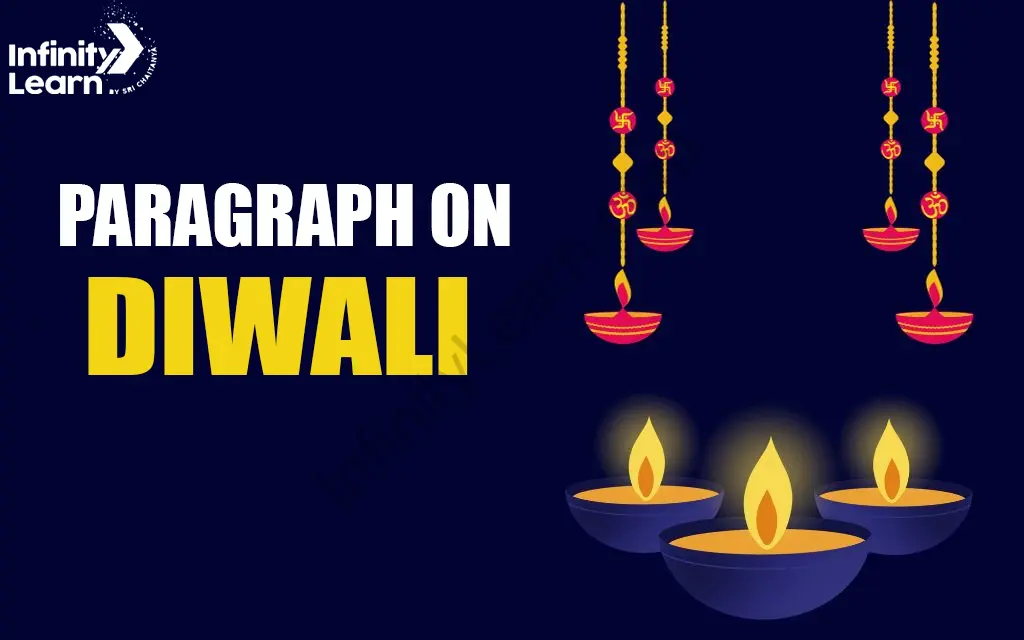
Short and Long Paragraphs on Diwali in English
We have provided below short and long paragraphs on Diwali essay in English for your knowledge and information.
After reading these Diwali paragraphs you will know everything about the Festival of Diwali and will be able to answer the questions like – when and why is Diwali celebrated; how is Diwali celebrated; significance of Diwali; how to celebrate a safe and eco friendly Diwali; how people of different community celebrate Diwali etc.
5 Days of Diwali 2023
| 12 November 2023 | |
| 04:21 PM to 06:02 PM | |
| 11:14 AM on Nov 12, 2023 | |
| 11:26 AM on Nov 13, 2023 | |

Diwali Date and Muhrat 2023
| 12 November 2023 | |
| 04:21 PM to 06:02 PM | |
These paragraphs will be extremely useful for you while taking part in debate, essay writing or speech giving competition on Diwali.
Diwali Paragraph 1
Diwali is a Hindu festival celebrated every year as a festival of lights. It is very significant festival for the people of Hindu religion. Everyone becomes very happy on the occurrence of this festival and celebrates with lots of preparations. Diwali is a five days long festival begins from Dhanteras and ends at Bhai dooj. It falls every year on fifteenth day of the Kartik month.
People start cleaning their houses few days before the main date of Diwali such as white washing, dusting, painting, etc. Houses get decorated using real or artificial flowers and other decorative materials. Everywhere looks very dazzling because of the lighting small earthen lamps and electric bulbs. It is considered that Goddess Lakshmi makes a visit to each houses in the night of Diwali that’s why everyone lights their houses to welcome the Goddess. In return, Goddess gives her blessings to her devotees for healthy and prosperous life. At this day, everyone performs puja of Goddess Lakshmi and God Ganesha and then distributes gifts and sweets to their friends, neighbors and relatives.
Diwali Paragraph 2
Diwali is one of the most favorite festival of everyone. It is a most enjoyable, sacred and loveliest festival in the Hindu religion. It is celebrated every year all through the country as well as abroad (by the Indian people) with great joy and enthusiasm. Everyone (especially kids) waits for this festival with much keen. This festival is celebrated from the ancient time to mark the happy return of lord Rama with his wife and brother to his Kingdom (Ayodhya) after long fourteen years of exile.
It is a five days long festival of lights and festivities, falls every year twenty days after Dussehra. It make us feel the advent of winter season. It brings lots of charms and delight in our life. Diwali is also known as Deepawali because we make a row or collection of many lamps out the home. People start festival preparations few days before the main date such as cleaning of houses, white washing of buildings, decorations, buy toys, gifts, flowers and other necessary things for festival. At this day people become very happy and distribute gifts to each other.

Diwali Paragraph 3
Diwali is an important festival for the people of Hindu religion. Everyone waits for this festival with eager in order to get lots of fun and pleasure while lighting candles and clay diyas in the night. We should be conscious of celebrating this festival without any harm to the public as well as environment. We should know that the crackers we burn on diwali is very disadvantageous to the health of people and environment. High pitch sound making crackers are enough to disturb human mind and balance of atmosphere. Some fire-rockets go very high in the sky which create the fear of fire if used in the residential colonies.
So, we should celebrate safe and happy diwali without crackers and other harmful materials in order to keep ourselves healthy and natural cycle in balance. It is the festival of lights and cleanliness, not the festival of firecrackers. It is the festival to worship Goddess Laxmi, not the festival to make anyone sorrow through the fire-rockets.
Diwali Paragraph 4
Diwali is everyone’s favorite festival. It is well known as the festival of lights and celebrated in all the parts of our country. It is also celebrated in the abroad by the Indian people with great enthusiasm. Few days before the festival, people start cleaning, whitewashing and decorating their houses and shops. In the night of Diwali, people lit lots of clay lamps or candles all around the houses and offices. Everywhere (villages, towns and cities) looks dazzling because of earthen lamps, candles and electric bulbs. Kids of the houses becomes very happy by wearing new clothes and distributing gifts among their friends, neighbors and relatives. In the night, all the family members worship (of Goddess Laxmi and God Ganesha) together and take blessings of the elders of the family.
Diwali Paragraph 5
Diwali festival is celebrated every year in the honor of Goddess Lakshmi. There are various myths for celebrating this festival. Diwali is celebrated by the Hindu people with honor and devotion. Variety of sweet dishes and other delicious dishes are prepared in the houses. In the evening at 6 pm we decorate our houses with candles, earthen lamps, electric bulbs, flowers to welcome the Goddess Lakshmi. Everyone gets prepared in the night after 8 pm for the worship of Goddess Lakshmi and God Ganesha.
We pray to the Goddess by offering flowers, sweet and agarbati to get blessings for prosperous and happy life. All the family members, friends and relatives get together at one place to add more joy to this festival.
Diwali night becomes full of crackers, noise and smoke however it is not safe for our health and natural environment. It creates toxic substances which gets intermingled into the fresh air and make environment polluted. We should take a pledge this Diwali to celebrate our further Diwali festival in safe and secure manner.

Diwali Paragraph 6
Diwali festival is popularly known as Deepavali in some parts of the country. It is also a festival of cleanliness and lights because we do cleanliness some days before the festival date and lit lamps in huge number in the night of Diwali. We get very excited for new dresses and delicious foods on this festival.
There are various historical significance of celebrating this festival such as birth of Goddess Lakshmi from the churning ocean, returning of Lord Rama to his kingdom after axile, achievement of moksha or nirvana by Mahavira, victory of goodness over evil demon Narakasura, homecoming of Pandavas after exile, Marwari New Year, and other stories.
It is a five days long festival celebrated with great enthusiasm and lots of preparations. We take blessings from the elder family members by touching their feet as it is our culture and tradition. We enjoy a lot in the night after worship as we burst crackers and fireworks and eat sweets and delicious dinner. At this occasion, many people start their business and new work.
Also Check: Essay on Diwali
Diwali Paragraph 7
Diwali is the festival of lights falls every year in the month of October or November. And, according to the Hindu calendar, it falls in the month of Ashwin. Diwali is also known as Deepawali in some regions of the country because we lit row of diyas or candle in the night of festival.
People decorate their house, office, and street with the earthen lamps, diyas or electric lights on the day of Diwali. It is a five days long festival start from Dhanteras and ends on Bhaiduj. There becomes huge rush in the market from few weeks before the main date of festival because people start buying clothes, jewellery, silver or gold coins, decorative things, electric bulbs, firecrackers, things related to food items, idols of Ganesha and Lakshmi, etc.
Diwali Paragraph 8
Diwali is a most popular festival in India, celebrated every year by the people of Hindu religion with great enthusiasm. The significance of celebrating this festival is to celebrate the returning of Lord Ram, Sita and Lakshman to Ayodhya after 14 years of exile as well as birth of Goddess Lakshmi from the churning ocean. We worship goddess Lakshmi and God Ganesha to get prosperous and wealthy life and wisdom.
On the night of Diwali, we lit diays for whole night to welcome the goddess and get blessings for whole year. All the family members get together at one place, do worship and pray to goddess. We clean, white wash and decorate our house to make it more beautiful and dazzling. In the night after puja, we get involved in lighting the lamps and fire crackers. Whole environment becomes full of high pitch noise and smokes of the firecrackers.
Diwali Paragraph 9
Diwali is a festival of lights, cleaning, worship, and gathering of family members and relatives. We share gifts and meet each other on the day of diwali. At this day, on one keeps bad feelings to anyone and meet everyone. This festival has many religious and mythological significance behind celebrating it. It falls every year in the month of October or early November and indicates the start of winter season. It is celebrated by the Hindu people all over India and abroad.
It marks the victory of goodness over badness means victory of good power over evil power. We greet each other a very happy diwali with gift packs and sweets. It is also celebrated by the people of Jain religion because on the same day, Mahavira had achieved moksha or nirvana in the 527 BCE. Arya Samajists celebrate Diwali as a Death Anniversary of the Swami Dayanand Saraswati. This festival keeps everyone close that’s why called as festival of love, brotherhood and friendship.
Diwali Paragraph 10
Diwali is a Hindu festival, popularly known as festival of lights. It is celebrated to symbolize the victory of goodness over evil power. It is the day when Lord Ram returned to his kingdom after many years of exile. In the happiness of his returning, the people of Ayodhya lighted the lamps everywhere. We buy new clothes, gifts and sweets to distribute among our neighbors, relatives, friends and family members. We also distribute gifts and sweets among poor people of the colony. Our parents buy fire crackers for us which we enjoy in the night after puja.
On the day of diwali Marwari people celebrate their new year however, a day after the Diwali Gujrati people celebrate their new year. I enjoy whole day of Diwali with my friends by playing the harmonium and other music instruments. In the late evening after puja, we take blessings from the elder family members by touching their feet.
Diwali Paragraph 11
Diwali festival is very important festival for the people of Hindu religion. It is the most favorite occasion being celebrated from the ancient time for many reasons. It is celebrated by the Jain people as Lord Mahavira attained Nirvana. It is a special day for the people of Arya Samaj as Maharshi Dayananda achieved his nirvana. It is also a special day for the Gujrati and Marwari people as they celebrate their new year. Sikh people celebrate Diwali as their Red-Letter when they get together and get blessings of their Gurus. The Golden Temple of Amritsar was also established on the day of Diwali in 1577.
Diwali festival has its own religious, cultural, and spiritual significance for Hindus. It brings people close to each other by removing all the problems between them. We honestly follow the culture of touching feet of elders in the family and get blessings for bright future.
Diwali Paragraph 12
Diwali or Deepawali is a festival when we lit lots of earthen lamps or electric bulbs. It is generally celebrated to commemorate the returning of Lord Rama to his kingdom after defeating the demon king Ravan. However, there are some other legends behind celebrating this festival. Diwali festival celebration gives us message of victory of good over evil. We decorate our whole house, town, village and city with the clay diyas, electric bulbs, flowers and other decorative things to welcome the Goddess Lakshmi.
Diwali is a five days long festival, each day named as Dhanteras, Naraka Chaturdashi (or Chhoti Diwali), Lakshmi Puja (or Main Diwali), Bali Pratipada (or Govardhan Puja), and Yama Dwitiya (or Bhaiduj). There is a tradition of buying new things on the day of Dhanteras and distributing gifts and sweets on the day of Diwali. We really enjoy this festival every year and eagerly wait for next year.
Paragraph on Diwali for Students – Paragraph 13
When and why diwali is celebrated.
Diwali is a Hindu festival of India celebrated on the darkest night (Amavasya) of the lunar month Kartik (According to the Hindu calendar); which usually falls in the ending October or the starting November month according to the Gregorian calendar.
Diwali or Deepawali (Sanskrit :meaning a row of deepa or lighted earthen pots) is celebrated symbolic of the victorious return of Lord Rama to his homeland Ayodhya; after an exile that lasted for 14 years and resulted in a victory of Rama over Ravana in a fierce battle fought in Lanka.
It took Rama 20 days after killing Ravana (celebrated as Dussehra) to reach Ayodhya along with Sita and Lakshman; traversing a distance of nearly 3000 kilometers.
Rama’s younger brother Bharata had also vowed to end his life if Rama didn’t return from exile. The return of Rama; therefore, brought tremendous joy for the people of Ayodhya which they celebrated welcoming him by lighting up the whole Ayodhya with earthen pots (diyas) along his path. It is this victorious return of Rama that Hindus celebrate on Kartik Amavasya each year.
In India Diwali is celebrated as a five day festival; beginning with Dhanteras, followed by Narak Chaturdashi (Choti Diwali), Lakshmi Pooja (Main Diwali), Govardhan Pooja and Bhaiduj. Each day of Diwali celebration has religious significance and a mythological story associated with it.
Pollution on Diwali
Though Deepawali is meant to be a festival of lights; unfortunately, today it has also turned into an environmental and as well as a social concern. The incessant production, sale and use of fire crackers during the festival are at the apex of the problem.
Sadly, today the noise has dominated the true essence of the festival of lights, leaving behind smoke and pollution; not to mention the fire accidents and potential injury that the crackers could cause. The burst of a cracker releases harmful gases like Oxides and Di-Oxides of Sulphur and Nitrogen apart from causing noise pollution.
So thick had been the smoke after Diwali celebration in Delhi NCR region that the Supreme Court had to intervene and temporarily ban the sale and use of crackers in NCR with effect from 9 th October 2016, which has been extended further till this year.
The Indian Firecracker Industry
We celebrate Diwali by bursting crackers, rejoicing in the different sounds and lights they emit; either totally unaware of the repercussion or acting insane. But the truth is always not pleasing, and the truth is that the Indian firecracker industry employs thousands of young children illegally; working in pathetic, dangerous and life threatening conditions which could hardly be imagined sitting inside our cozy homes.
The least we can do to help those under privileged children is to say No to crackers! When the demand dies the supply and production will die automatically; ending to the misery of such children. Take a pledge this Diwali not only to celebrate but also to make a difference-‘Change your thought and save lives.’
Firecrackers are Harmful
If you think rationally it will not take long to conclude that firecrackers are a nuisance. Apart from causing environmental pollution they also pose a serious threat to health and property. Bursting of crackers or burning different types of lightning sticks releases harmful gases like Nitrogen Dioxide and Sulphur Dioxide; which could cause serious respiratory problems like asthma and other lung diseases. Not to say the harm it does to people already suffering from such diseases.
Firecrackers are a menace for the animals too. Animals are very sensitive to the variations in sound and are disturbed by loud sudden burst; often resulting in behavioral changes. There had been documented incidents of birds leaving their abode in night, scared from the light and sound; and eventually dying on colliding with buildings, trees and other objects.
Celebrate an Eco-Friendly Diwali
Diwali is a festival of joy, its foundation could not be based on the suffering and sorrow of others and harm to the environment. This Diwali take a pledge to not buy or use crackers, avoid using decorative lights, plastic decorative items, artificial colorants and plastic gift wrappers.
Also avoid using conventional greeting cards for the occasion; rather go green by sending E-Greetings or generating a Facebook post.
Enlighten your house with earthen pots, diyas and use natural fresh flowers for decoration. Remember that it is a festival of light not sound! It symbolizes the return of a much loved King to his kingdom and it is not right way to welcome king with noise and pollution.
Paragraph on Diwali FAQ’s
What is diwali for students.
For students, Diwali is a festive holiday known as the Festival of Lights. It symbolizes the victory of light over darkness or good over evil and is celebrated with lights, fireworks, sweets, and gifts. Educational institutions often host cultural programs and craft activities related to Diwali.
Why is Diwali important?
Diwali is important because it represents the triumph of light over darkness, knowledge over ignorance, and good over evil. It's a time for renewal, celebration with family and friends, and a look towards the future with hope and positivity.
What is Diwali short notes for kids?
Diwali, or the Festival of Lights, is a time when people light lamps, set off fireworks, and eat sweets. It celebrates the victory of good over evil and the lifting of spiritual darkness. Families clean their homes, exchange gifts, and pray for prosperity.
What is Diwali in kids' words?
Diwali is a big festival when we light up our houses with lamps and candles. We make colorful designs, play with fireworks, eat lots of tasty food, and get new clothes. It's a happy time with family and friends.
How is Diwali for kids?
For kids, Diwali is exciting and festive. They participate in lighting lamps, bursting crackers, and enjoying special meals. Children often receive gifts and are involved in family and community celebrations, making it a joyous time.
How to write 10 lines about Diwali?
When writing about Diwali, discuss its designation as the Festival of Lights, its representation of good over evil, traditional activities (lighting lamps, fireworks), cultural aspects (prayers, special food, family gatherings), and its joyful celebration with festive decorations and events.
Related content
Talk to our academic expert!
Language --- English Hindi Marathi Tamil Telugu Malayalam
Get access to free Mock Test and Master Class
Register to Get Free Mock Test and Study Material
Offer Ends in 5:00

COMMENTS
Essay on Eco-Friendly Diwali. Diwali is the festival of lights. It's a celebration that marks the victory of good over evil, light over darkness and knowledge over ignorance. Diwali is celebrated across all communities of India, creating a homogenous environment of goodwill and happiness. It is a festival to celebrate with family and friends ...
An eco-friendly Diwali focuses on celebrating the festival in a way that minimizes harm to the environment. It involves the use of sustainable and environmentally-friendly practices, such as using eco-friendly decorations, minimizing the use of firecrackers, and reducing waste generation. The idea is not to compromise the festive spirit but to ...
Diwali Essay in English 300 Words (For 9,10 and 11 Class Students) ... To preserve the tradition, you can choose to burst just a few crackers and celebrate in an eco-friendly way. Diwali is a festival that brings joy to everyone. However, amid all the celebrations, it's easy to overlook the fact that bursting crackers lead to noise and air ...
Here we have shared the Essay on Diwali or Deepawali in detail so you can use it in your exam or assignment of 150, 300, 500, or 1000 words. ... While celebrating, it is essential to be mindful of the environmental impact and embrace eco-friendly practices. Diwali is not just a festival of lights; it is a celebration of life, positivity, and ...
Long Essay on Diwali, Pollution Free and Eco-friendly Deepavali in 600 Words Deepawali, also known as Diwali, is one of the most popular and auspicious festivals celebrated in India.
Diwali Essay in English 500 Words. Diwali, the festival of lights is celebrated in the honour of the victory of Lord Rama over Sri Lanka King Ravana. It is also known as Deepavali, Deepavali means the array of lights. ... Some people celebrate eco-friendly Diwali by just lighting the diyas in their homes and temples and avoid firing crackers as ...
Essay on Diwali, Pollution and Eco-friendly Diwali - 5 (600 Words) Introduction. Diwali is the time to meet and greet our loved ones, prepare delicious sweets, wear new clothes, redecorate the house and worship Goddess Lakshmi. It is also the time to burn fire crackers.
The significance of celebrating Diwali in an environmentally responsible manner: - Diwali, which is environmentally friendly, helps to decrease noise and pollution. - By choosing eco-friendly options, you can quickly minimise your energy use. - Earthen diyas are ideal and may be readily discarded without harming the environment.
This Diwali festival of lights warns the victory of good over wrong. Diwali festival a great time to get together as a family, conferences, festivals and warm relations. Diwali festival of lights. In this, we are continuing to focus on the wonderful beliefs to make the most common and environmental party that we have found.
Diwali is celebrated in every corner of India. In this article, we are sharing some examples of Essay On Diwali for kids and students of classes 1 to 8 in easy English. With the help of this article, you can write 5 to 10 Sentences (lines) and short essays of 120 to 150 words. Moreover, we have also included a long essay on Diwali for students.
Diwali Essay in English 400 Words. As per the Hindu calendar, Diwali falls on the new moon (Amavasya) during Kartik month. This is considered one of the most auspicious times in the Hindu religion. ... Essay on Diwali, Pollution, and Eco-friendly Diwali in 600 Word. Diwali is the time to meet and greet our loved ones, prepare delicious sweets ...
500+ Words Essay on Diwali. First of all, understand that India is the land of festivals. However, none of the festivals comes close to Diwali. It is certainly one of the biggest festivals in India. It is probably the brightest festival in the world. People of different religions celebrate Diwali.
Write an essay 100 words. Solution. Verified by Toppr. Eco-Friendly Diwali: Celebrating Diwali and all other festivals without causing pollution is the direst need of the hour; if we don't celebrate them in an eco-friendly way, we may not live to celebrate them for the years to come. All life forms adapt according to the existential ...
Let's dive into how kids can write an essay on Diwali in english! 10 Lines on Diwali for Kids. ... Essay on Eco Friendly Diwali or Green Diwali. The following eco friendly diwali essay can help kids write an essay on Deepavali around an environmental theme, which will definitely impress both teachers and relatives! ...
The bursting of fireworks and crackers leads to air and noise pollution. In recent years, there has been a growing awareness of the need to celebrate Diwali in an eco-friendly manner. Many individuals now opt for eco-friendly fireworks or refrain from using them altogether. Community Bonding. Diwali fosters a sense of community and togetherness.
It's time to light up our lives and the environment in a more eco-friendly way! So, grab your eco-warrior capes, and let's embark on a journey to discover how to celebrate Diwali without crackers while keeping the joy alive. Also Check : Essay on Diwali in English for Students. Diwali: A Glittering Reminder
Sample Speech 3 on Eco-friendly Diwali. Ladies and gentlemen, Today, I stand before you to shed light on the concept of an "Eco-friendly Diwali" and its significance in our lives. Diwali, commonly known as the Festival of Lights, holds great importance in Indian culture and is celebrated with immense joy and enthusiasm.
Looking for how to celebrate eco friendly Diwali? Here are some easy tips and ways to celebrate eco friendly Diwali with your kids. This can also be used to write an essay for '10 lines on Green Diwali' This is becoming increasingly important and essential with rising pollution levels every year and quality of air worsening after festivals.
Eco-Friendly Diwali: Celebrating Diwali and all other festivals without causing pollution is the direst need of the hour; if we don't celebrate them in an eco-friendly way, we may not live to celebrate them for the years to come. All life forms adapt according to the existential challenges and difficulties, man included.
Eco Friendly Diwali essay, Quotes, Lines: The cardinal symbolism of Diwali is the idea of the ascension of light over darkness. To express this ages-old spiritual & religious concept, the festival is celebrated by lighting up diyas, candles and decorative lamps.
Essay on Diwali 200 Words. Diwali, celebrated by billions of people, is India's grandest and most renowned festival, known for its joyous and vibrant atmosphere. It is widely observed by Hindus and Indians residing in foreign countries. Often referred to as the "Festival of Lights," Diwali signifies the triumph of good over evil.
8. Do not throw away stuff. 9. Discard waste responsibly. Auspicious Days of Diwali in 2020. 1. Use oil diyas or lamps instead of electric lights. Nothing is more beautiful than the diyas of oil. This year, ditch electric lights for earthen pots and oil diyas and lamps.
Celebrate an Eco-Friendly Diwali. Diwali is a festival of joy, its foundation could not be based on the suffering and sorrow of others and harm to the environment. This Diwali take a pledge to not buy or use crackers, avoid using decorative lights, plastic decorative items, artificial colorants and plastic gift wrappers.